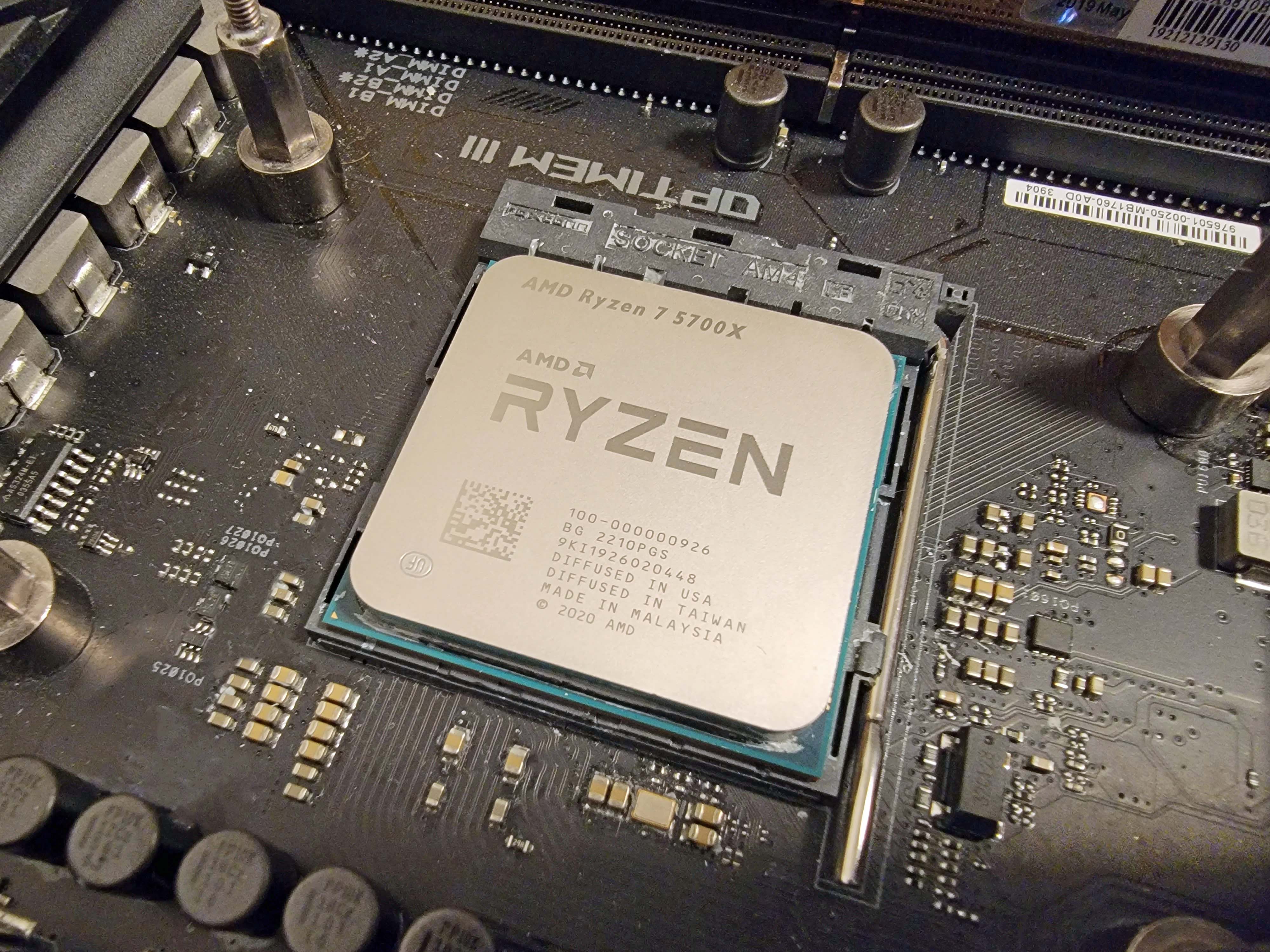Why you can trust Tom's Hardware
AMD Ryzen 7 5700X Application Benchmarks — The TLDR
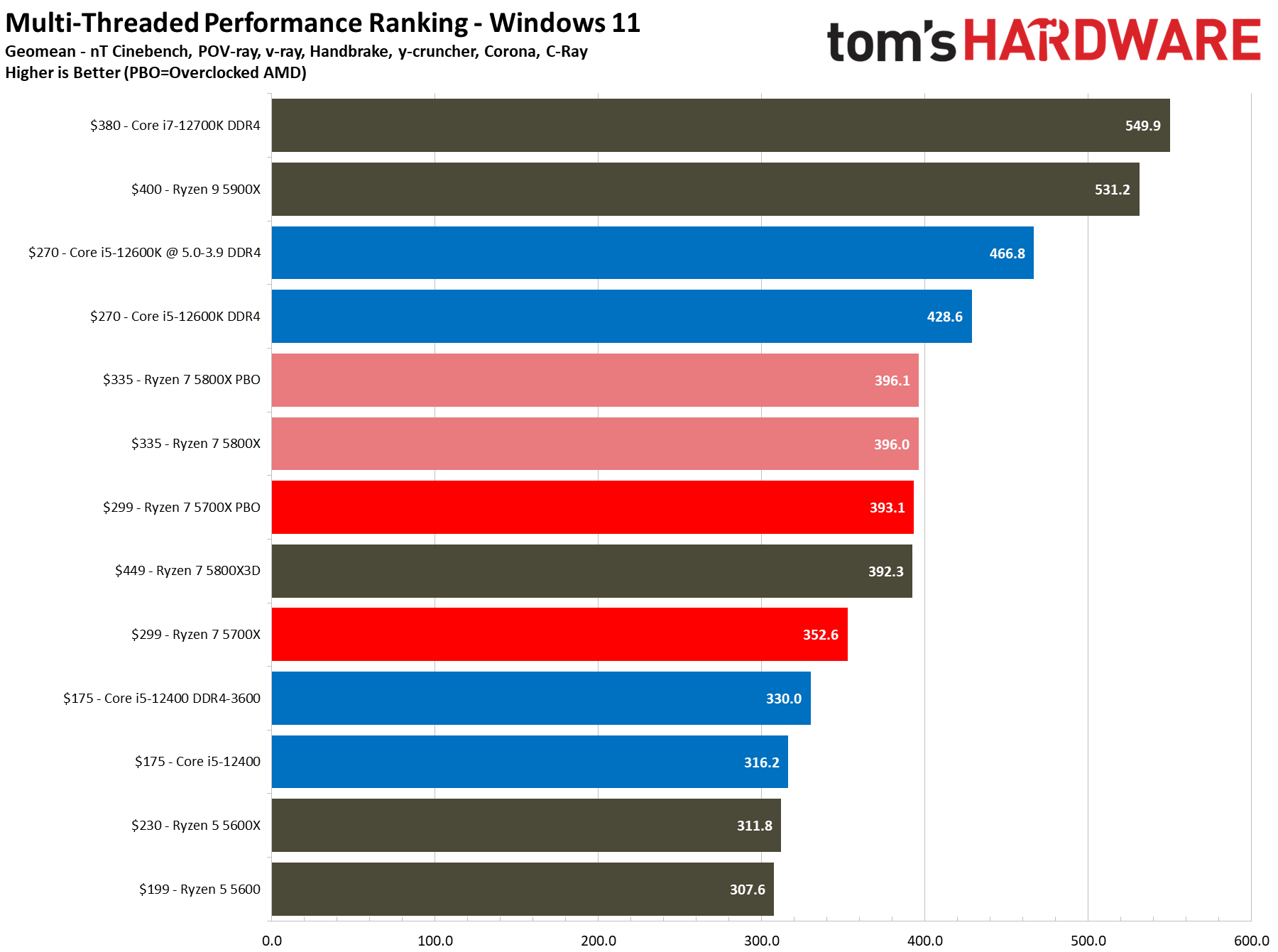
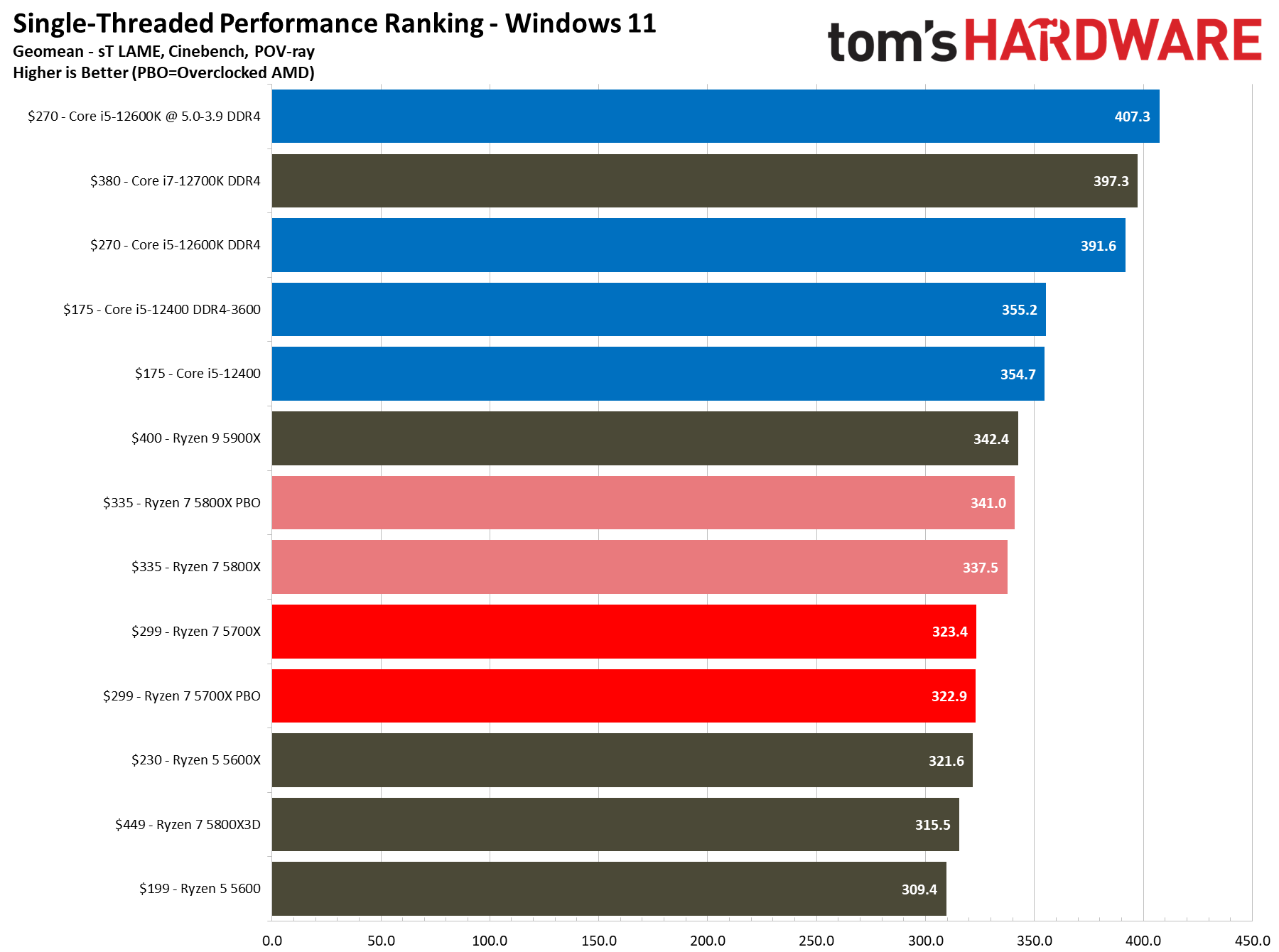
We can boil down productivity application performance into two broad categories: single- and multi-threaded. These slides show the geometric mean of performance in several of our most important tests in each category, but be sure to look at the expanded results below.
The Ryzen 7 5800X is 4.4% faster in our cumulative measurement of single-threaded work, which is within expectations given its slightly higher boost clock rate. The Ryzen 5 5600X also offers nearly the same performance as the 5700X. As expected, engaging PBO doesn't change much in this metric, as it doesn't boost the peak clock rates. Rather, PBO improves performance in multi-core workloads, as we see in the threaded tests.
The Ryzen processors simply can't keep pace with the Alder Lake chips in single-threaded work: The Core i5-12400 is 9.7% faster than the Ryzen 7 5700X in single-threaded work, while the Core i5-12600K is a whopping 21% faster at stock settings, and 26% faster after overclocking.
The multi-threaded results reveal that the Ryzen 7 5800X is 12% faster than the stock Ryzen 7 5700X, but engaging PBO shrinks the delta between the chips to less than one percent. But, again, the 5700X and 5800X are remarkably similar after tuning.
In threaded work, the Ryzen 7 5700X is 11.5% faster than the Core i5-12400 at stock settings and 19% faster after tuning, showing that its only real advantage over the 12400 resides in multi-threaded applications. The Core i5-12600K puts its e-cores to good use, though, carving out a 21% lead at stock settings and an 18.7% lead after tuning. That's impressive given its lower price point, not to mention that it beats the 5700X by convincing margins in single-threaded work and gaming, too.
| Tom's Hardware - Application Benchmarks | Single-Threaded | Multi-Threaded |
| Core i7-12700K DDR4 | 100% | 100% |
| Core i5-12600K DDR4 | 98.6% | 77.9% |
| Core i5-12400 DDR4 | 89.3% | 57.5% |
| Ryzen 9 5900X | 86.2% | 96.6% |
| Ryzen 7 5800X | 85% | 72% |
| Ryzen 7 5700X / PBO | 81.4% / - | 64.1% / 71.5% |
| Ryzen 5 5600X | 81% | 56.7% |
| Ryzen 7 5800X3D | 79.4% | 71.3% |
Rendering Benchmarks on AMD Ryzen 7 5700X
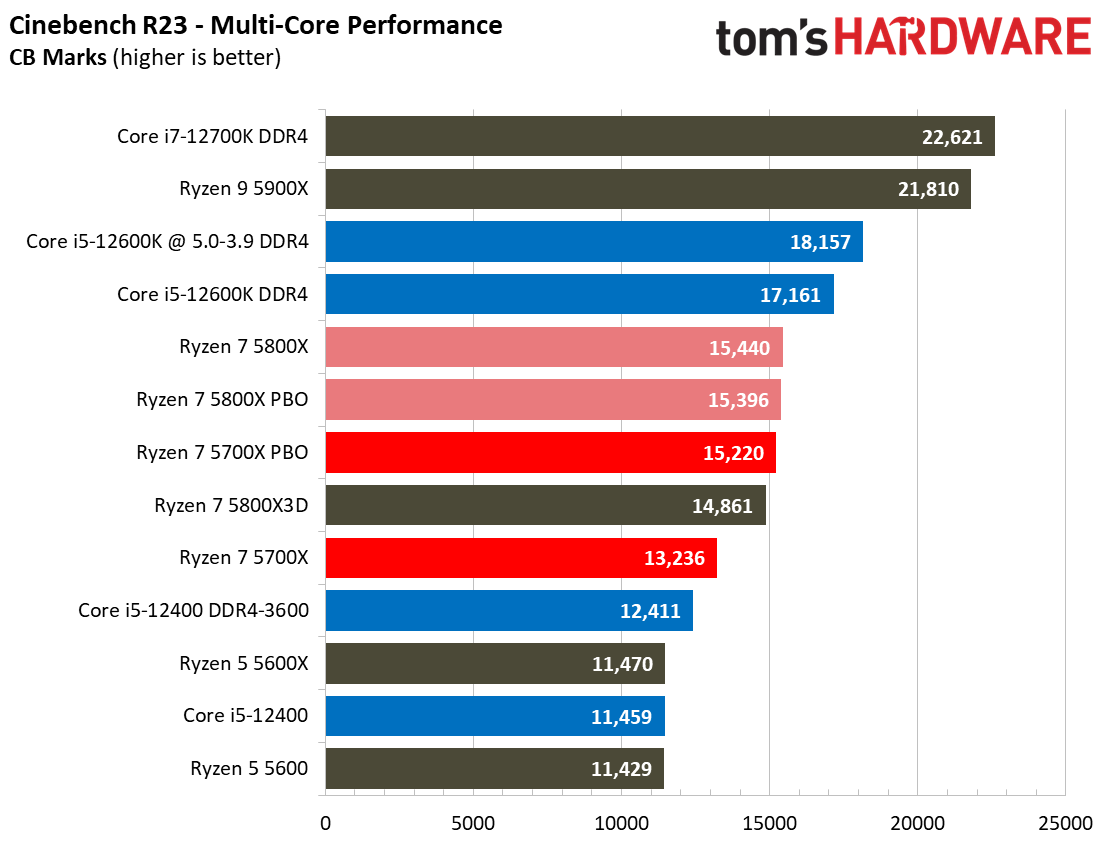
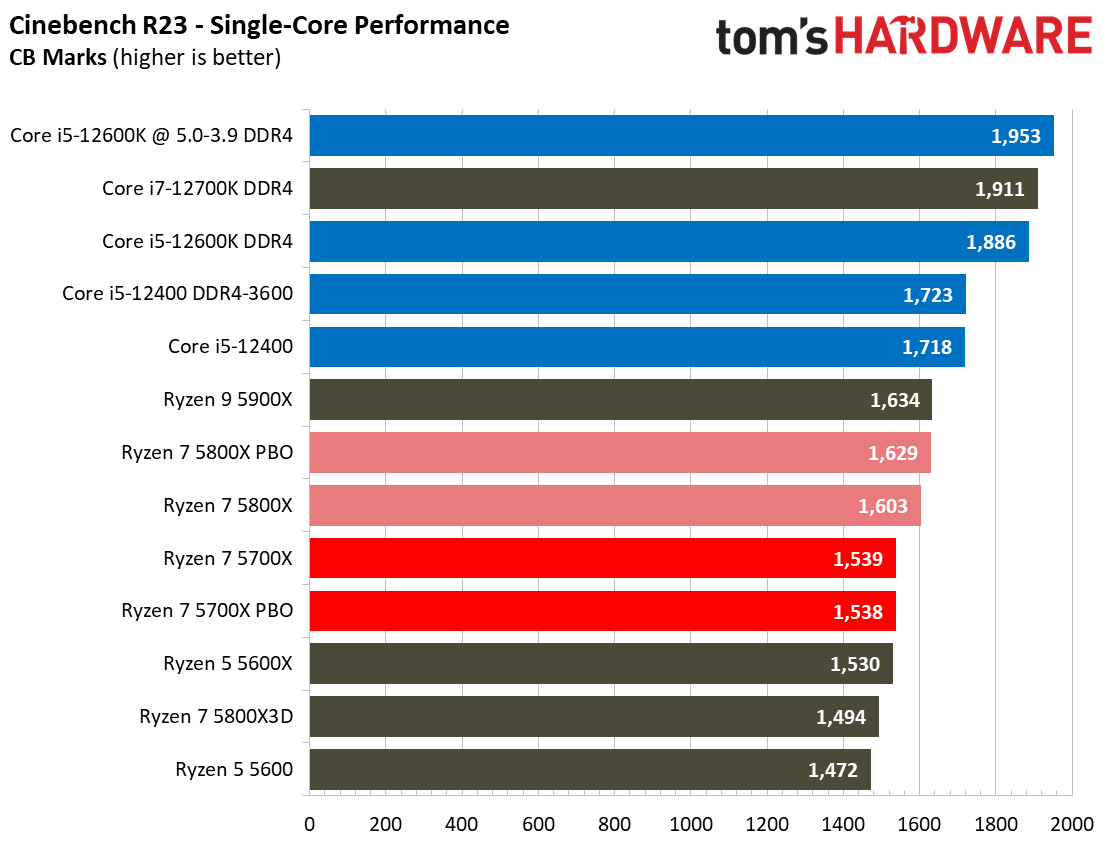
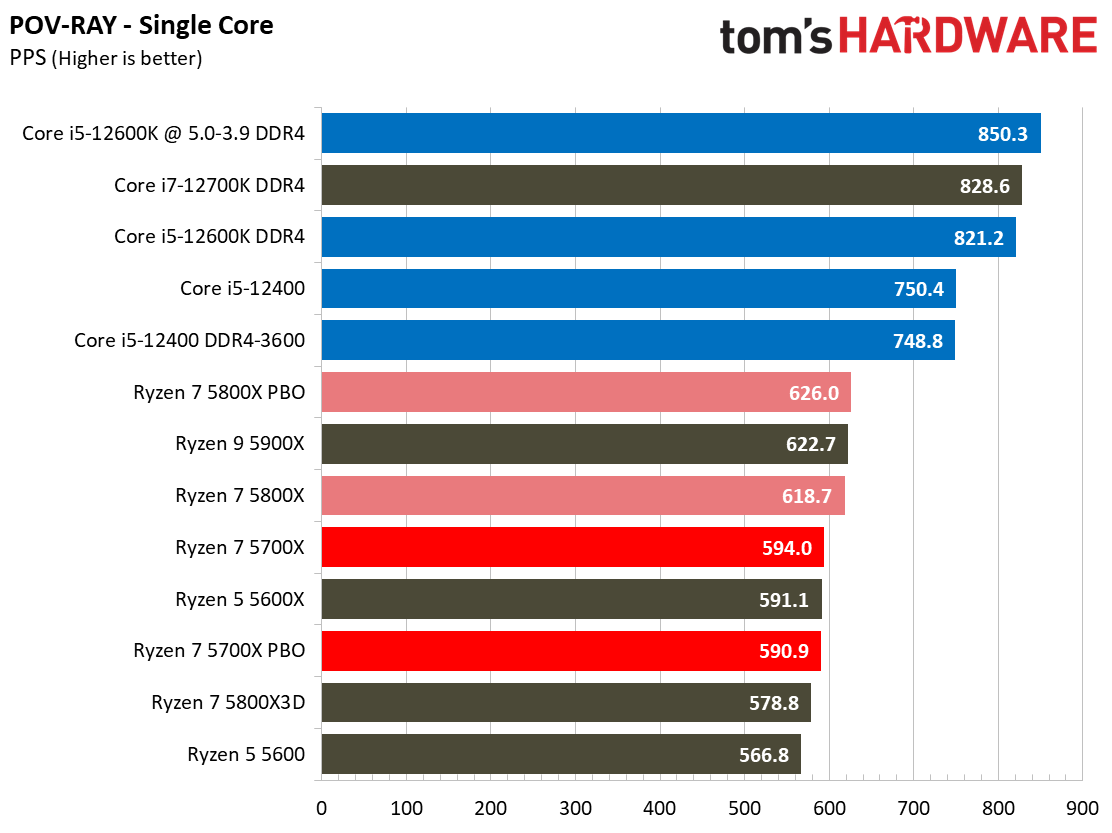
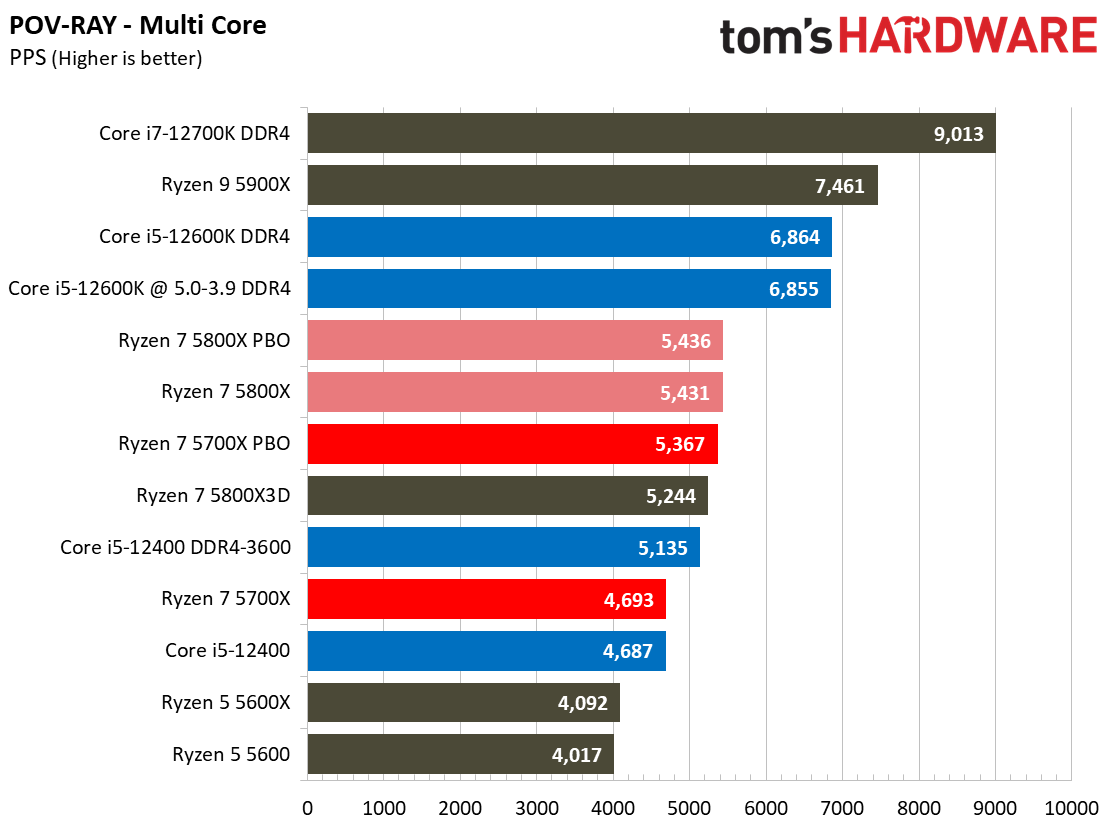
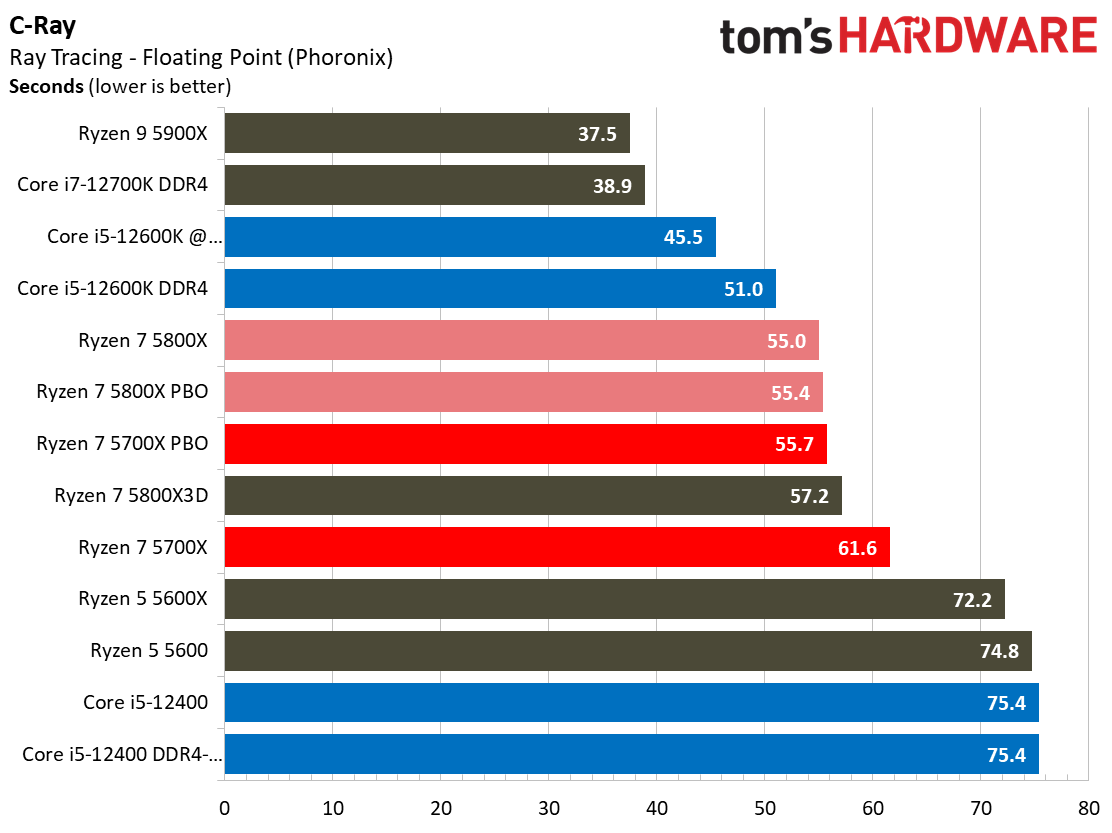
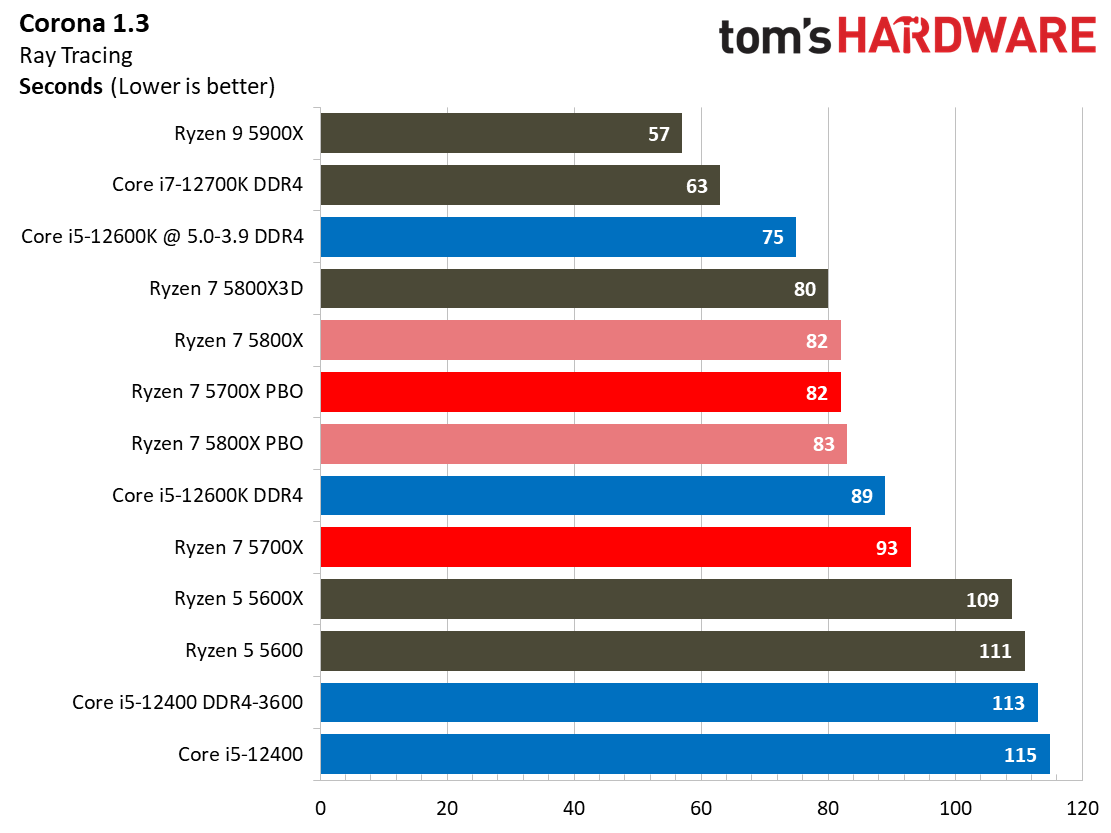
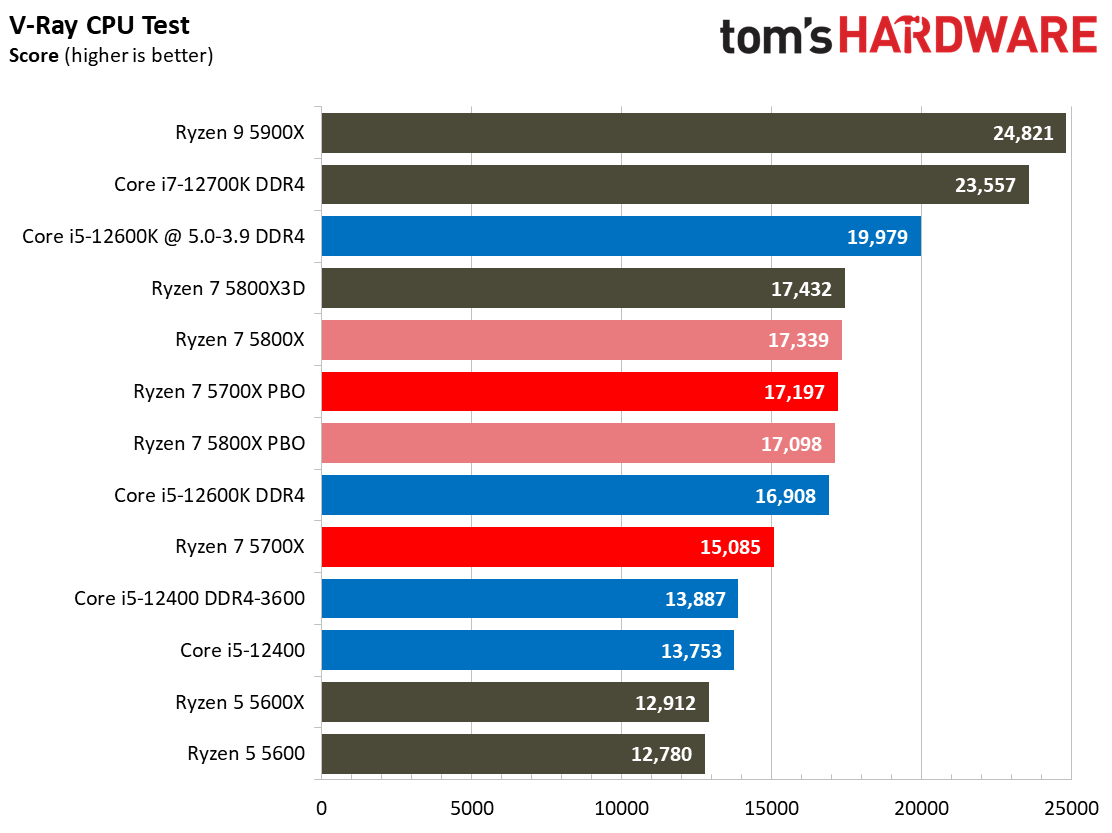
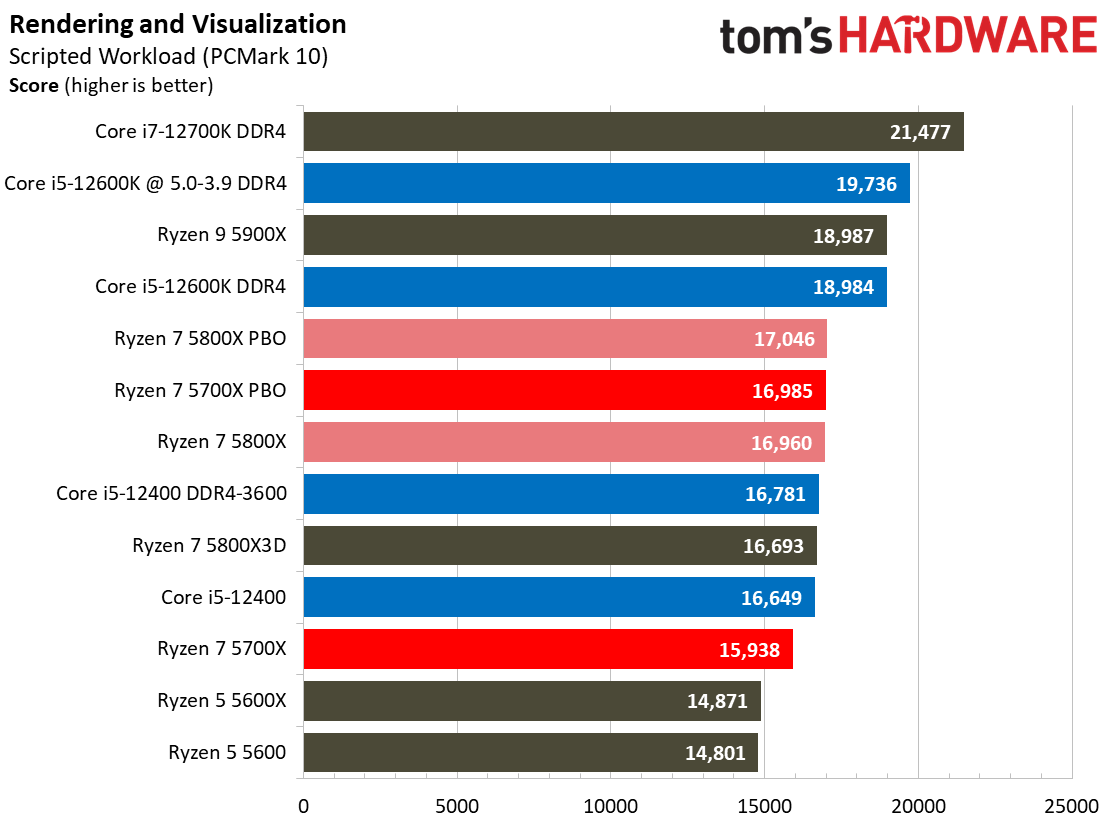
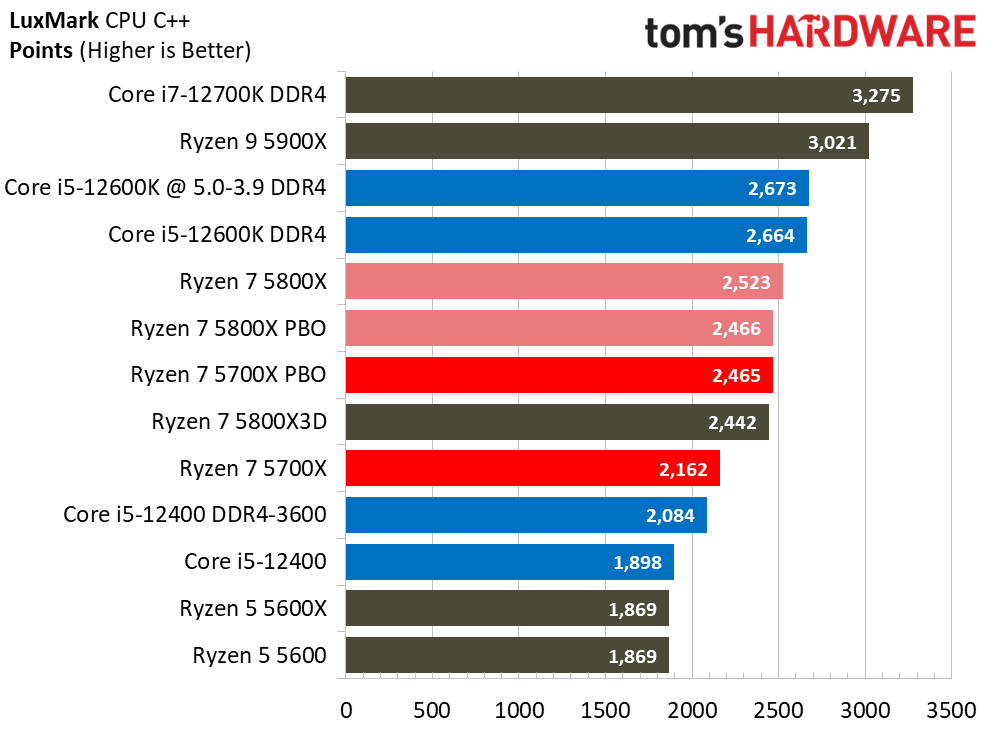
The same general trends we saw in the cumulative multi-threaded performance measurements are clearly at play in this series of tests. After overclocking, the Ryzen 7 5700X is essentially the same processor as the Ryzen 7 5800X, but the Core i5-12600K still takes the lead across the board. The Core i5-12400 can't match the more generously endowed chips but is surprisingly performant given its price, particularly in single-threaded tasks.
Encoding Benchmarks on AMD Ryzen 7 5700X
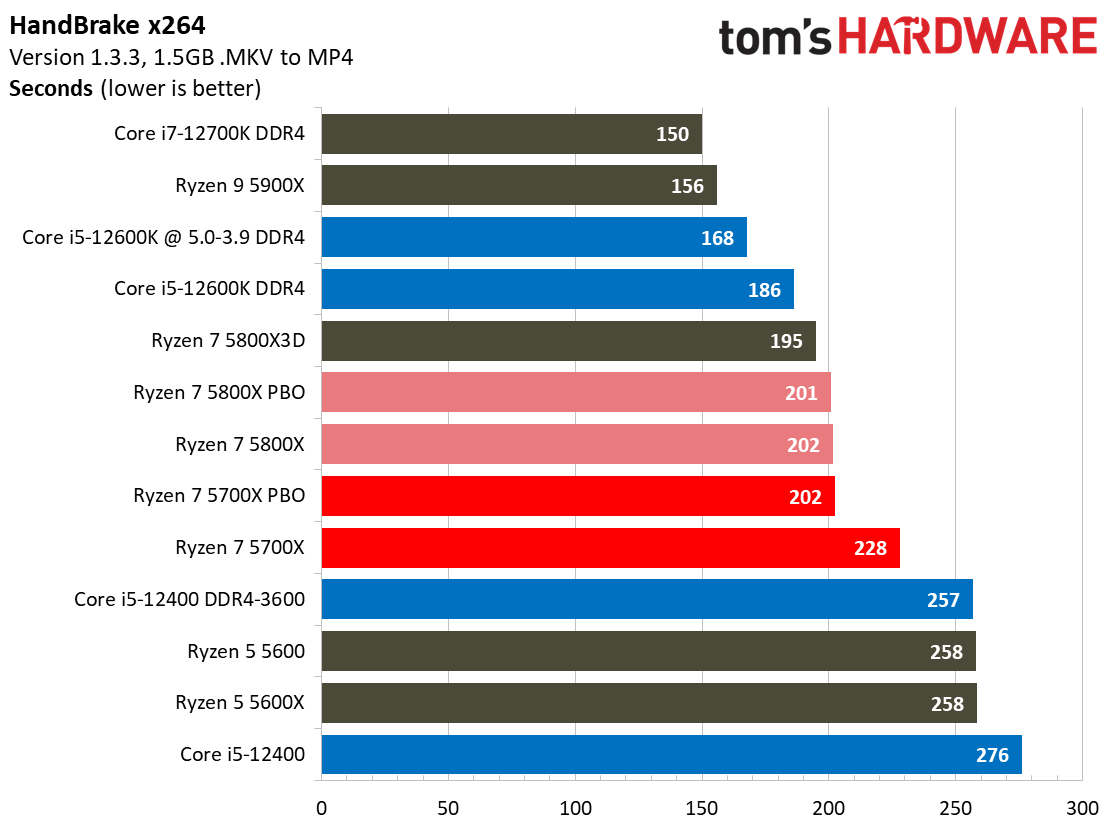
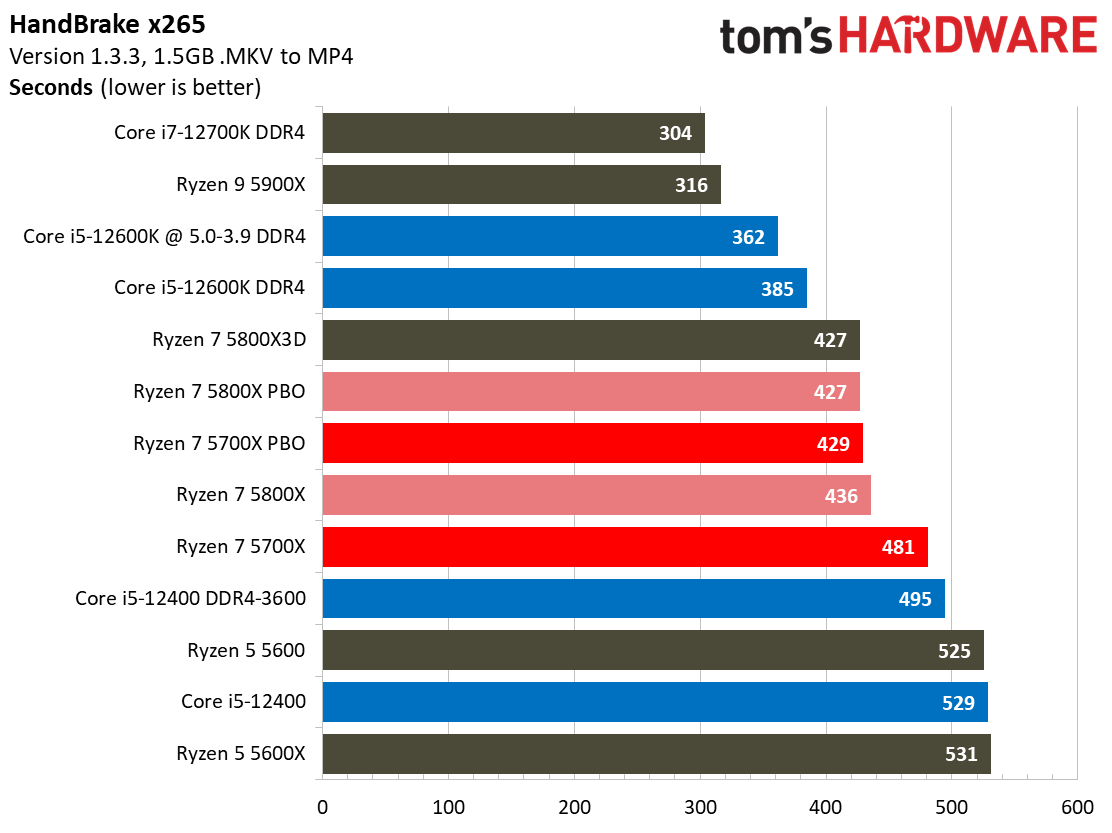
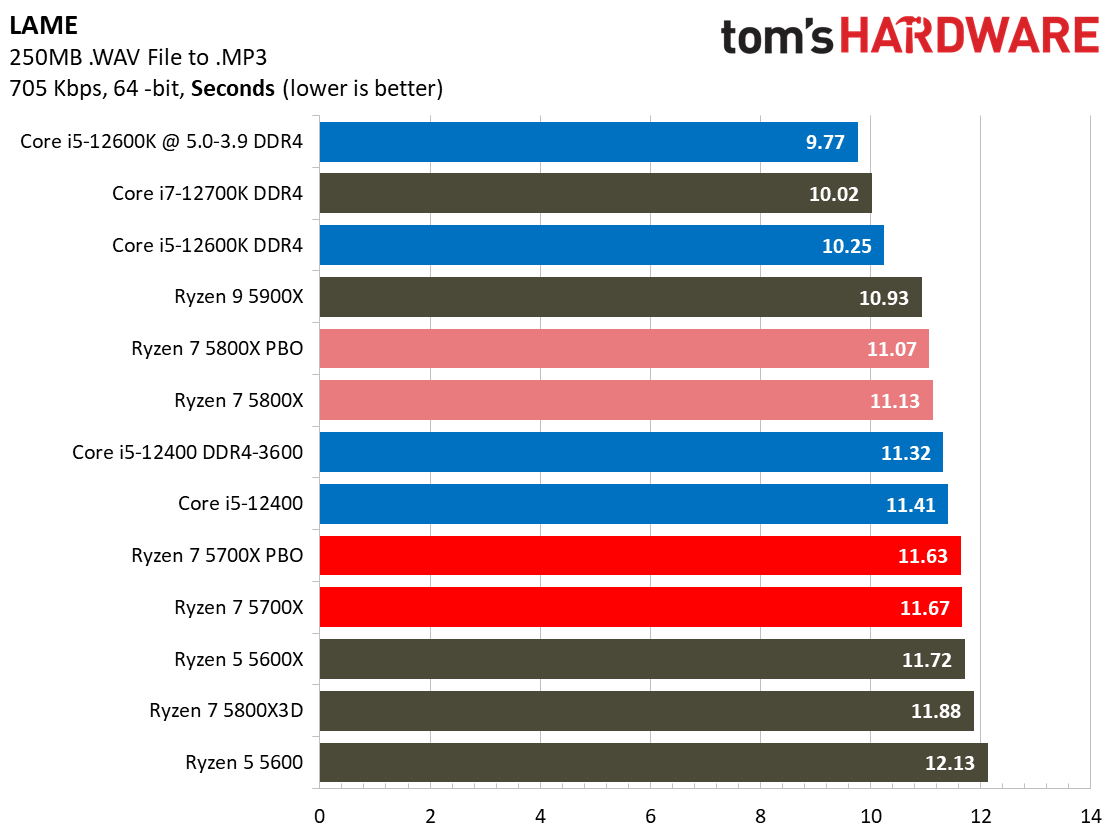
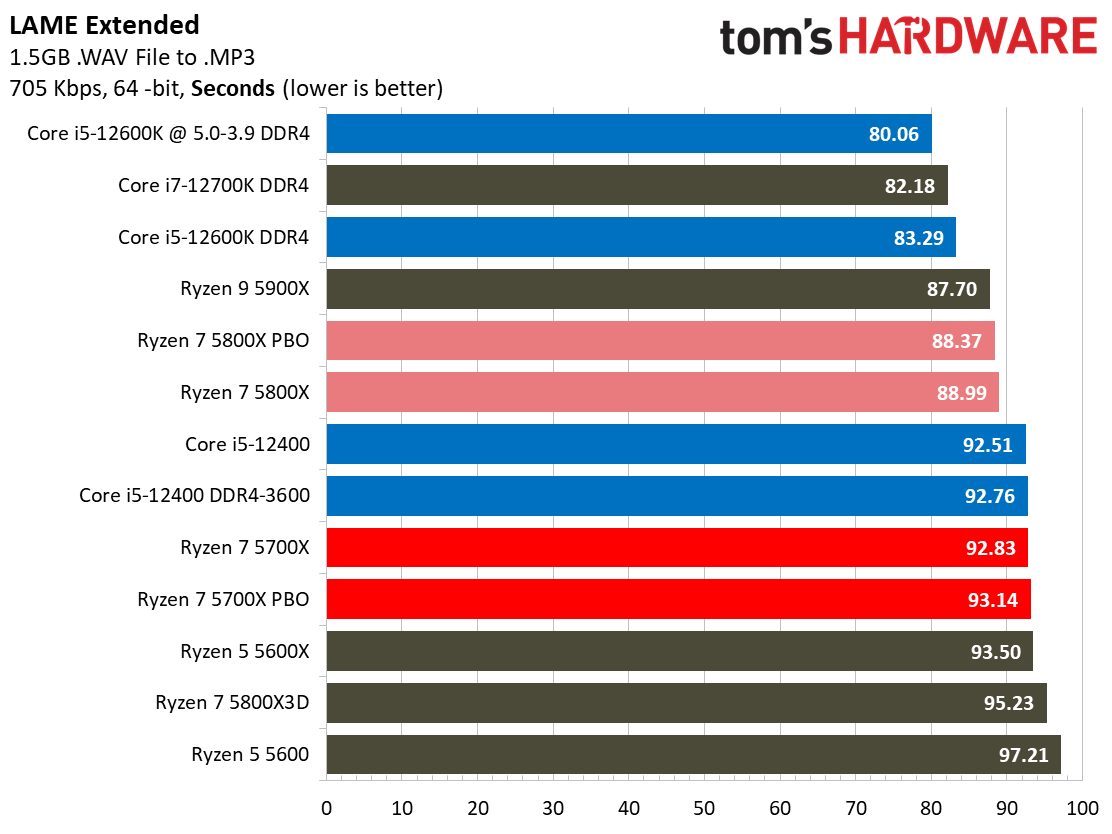
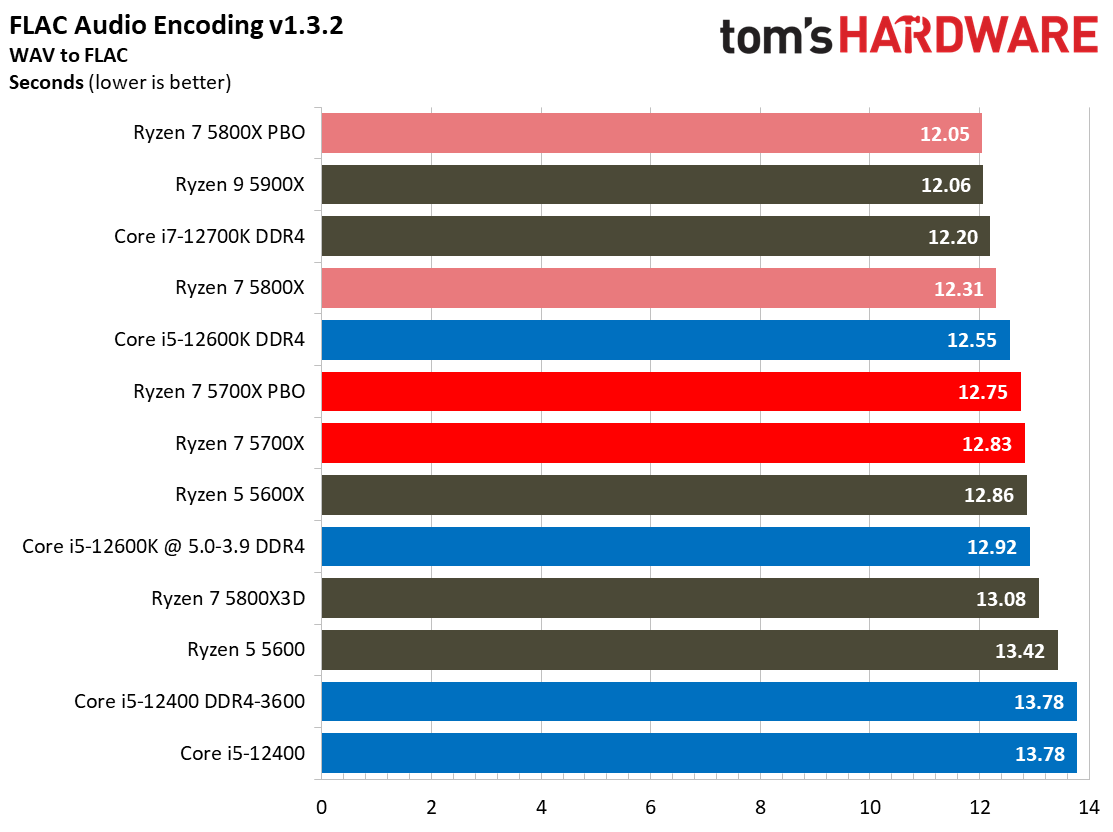
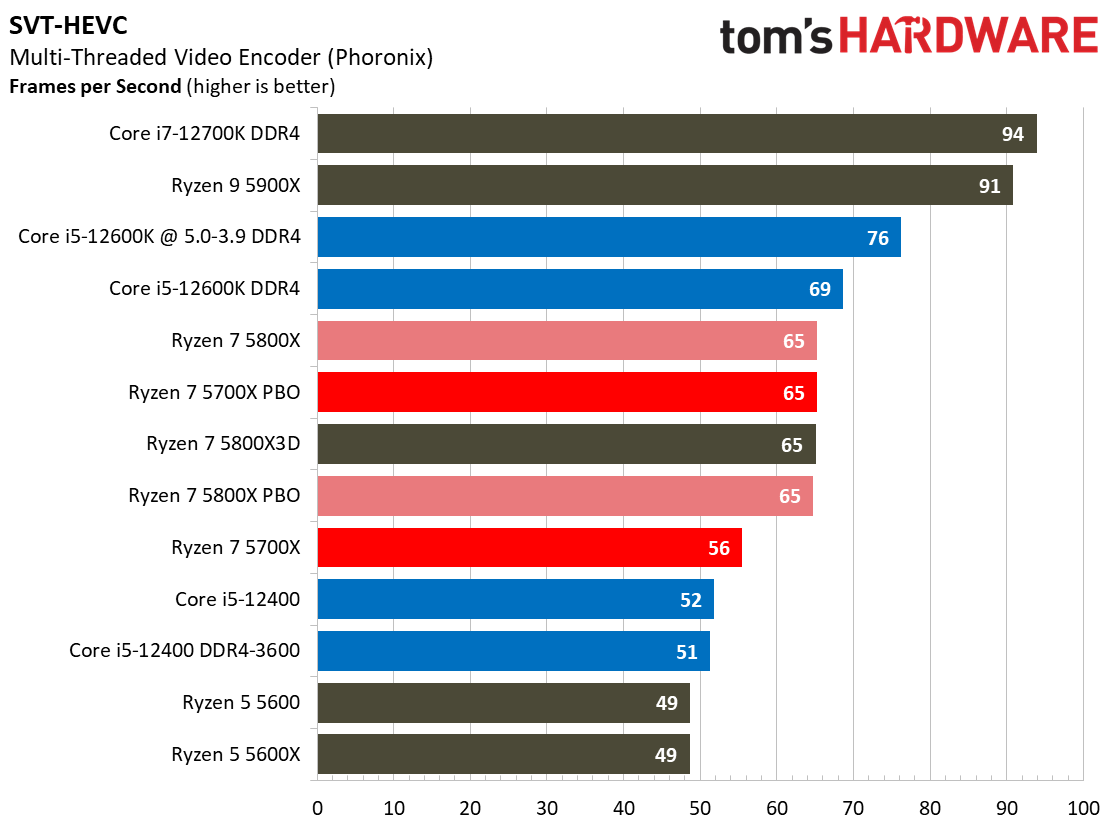
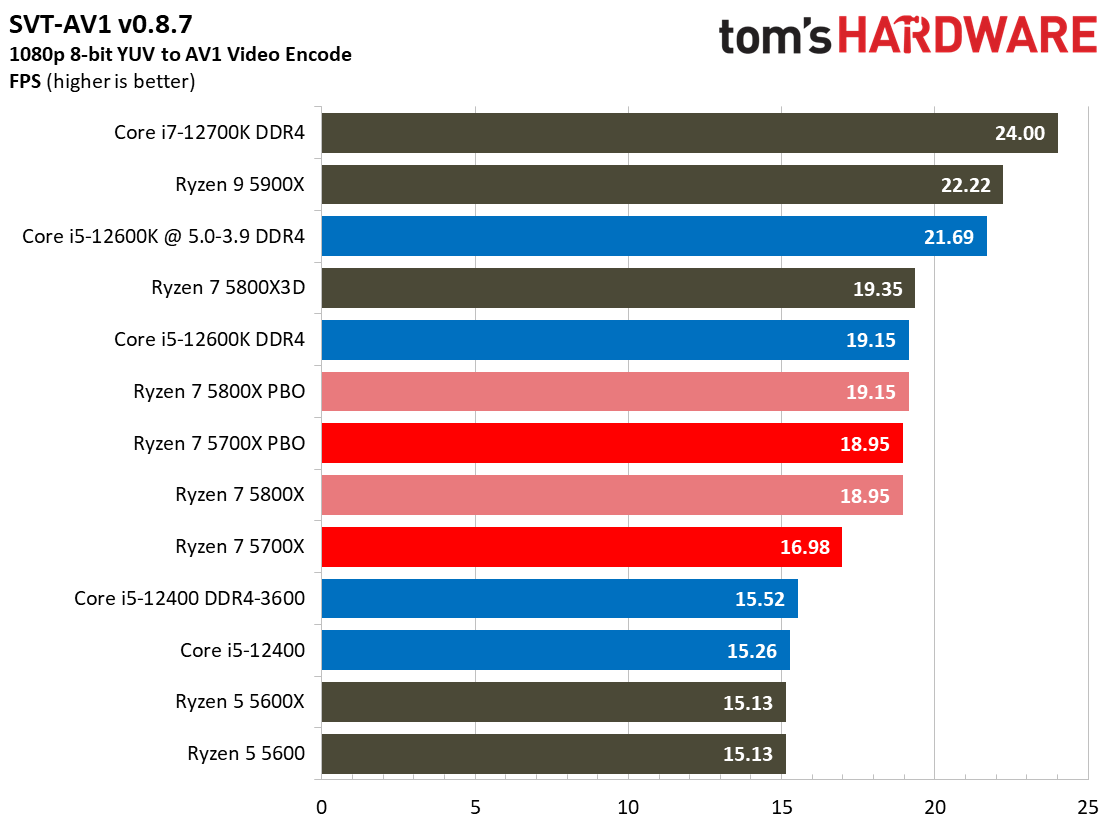
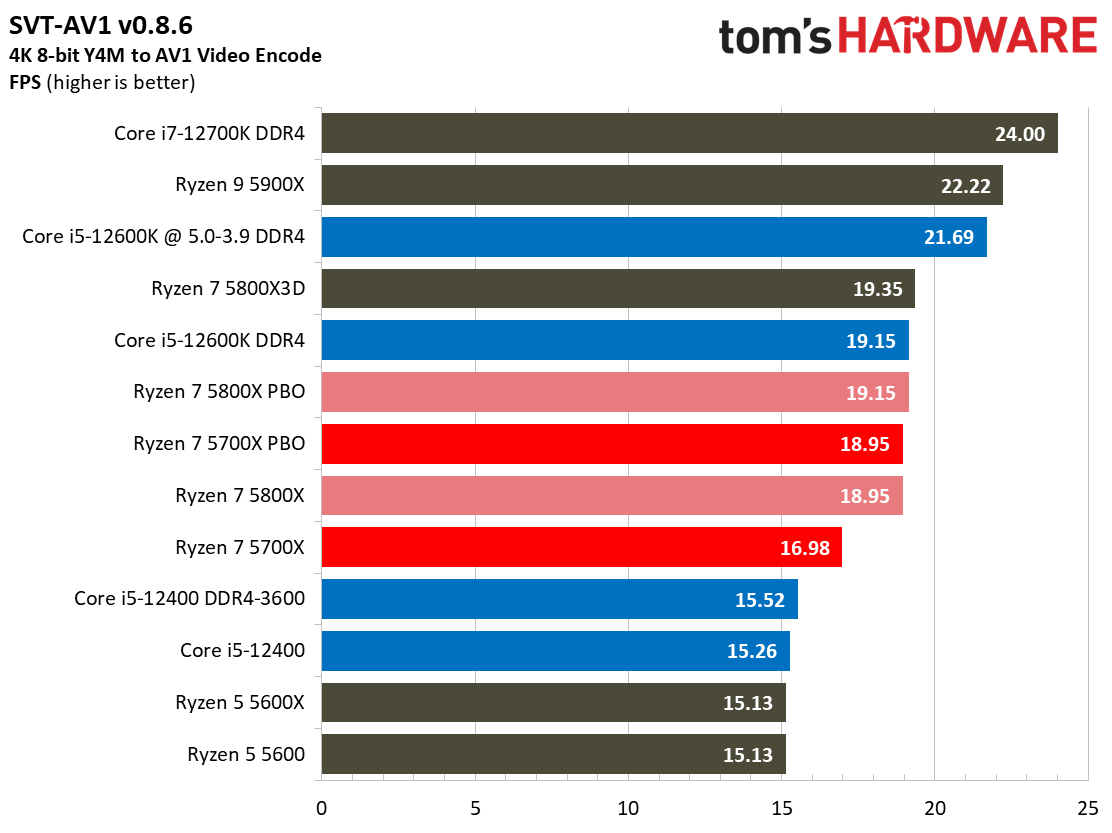
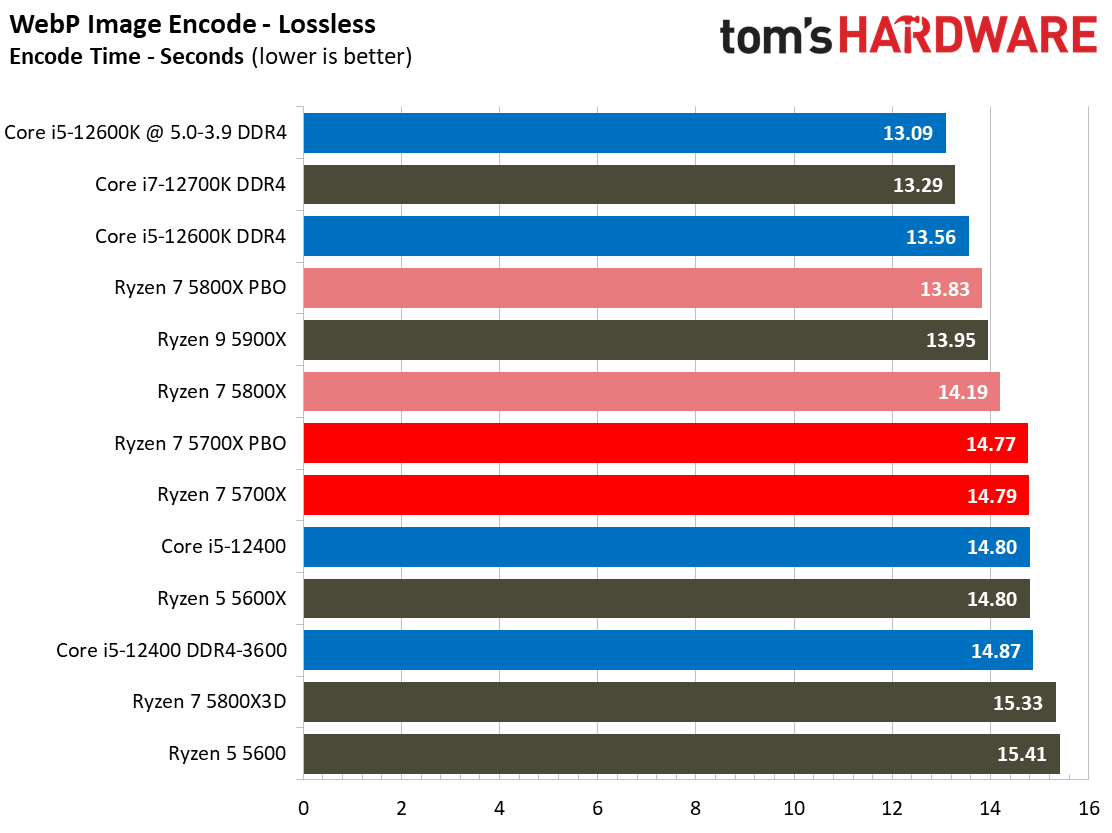
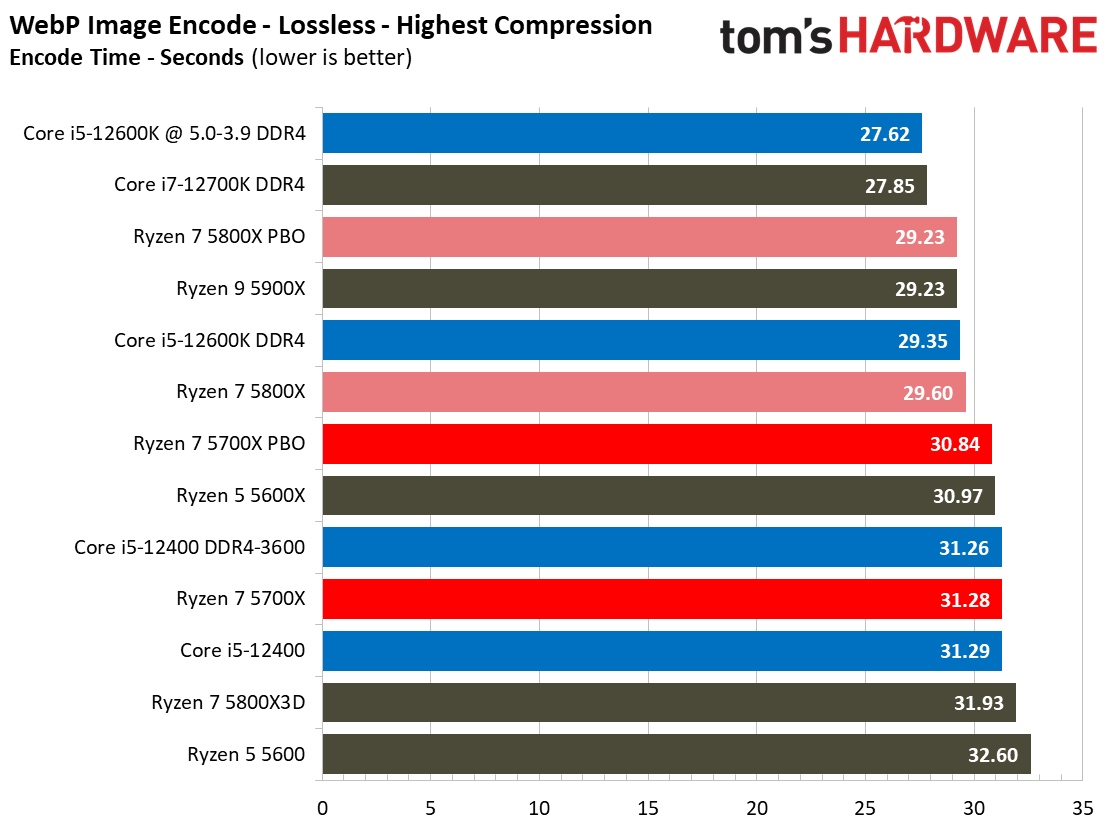
It's easy to spot the lightly-threaded encoders in this lineup — the Intel chips lead the chart for each of them.
Get Tom's Hardware's best news and in-depth reviews, straight to your inbox.
Web Browsing, Office and Productivity on AMD Ryzen 7 5700X
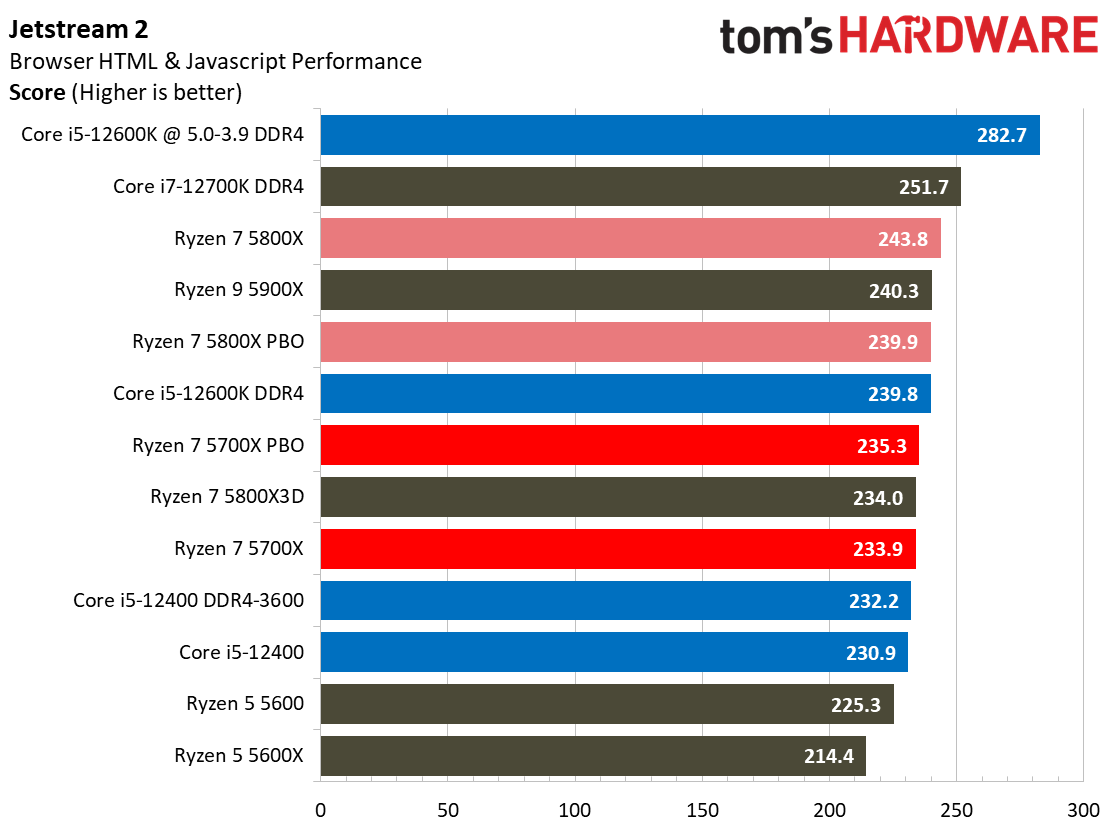
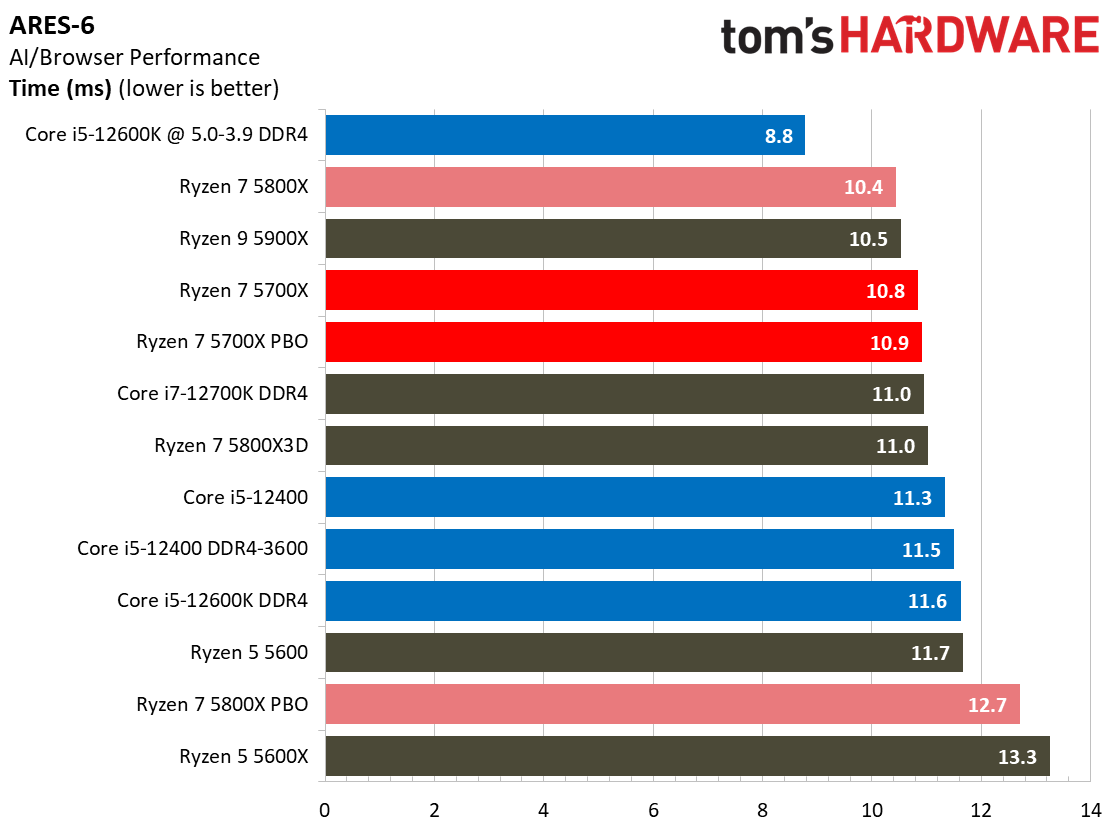
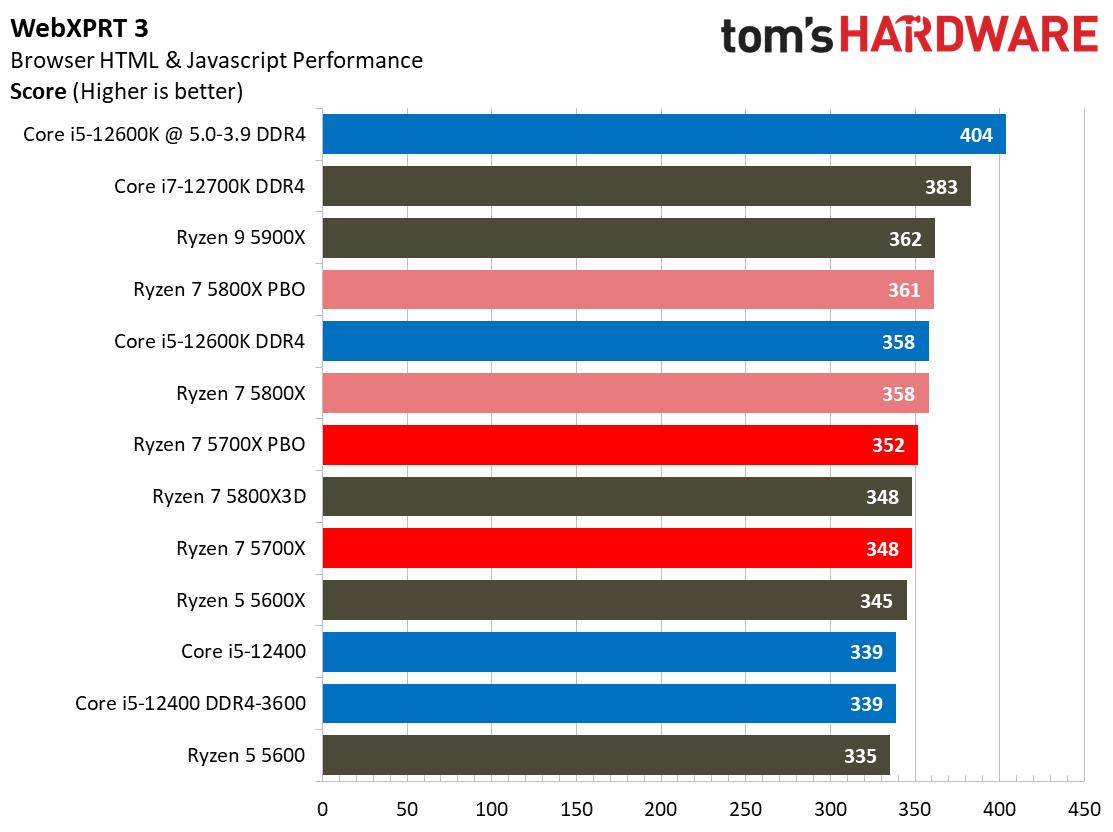
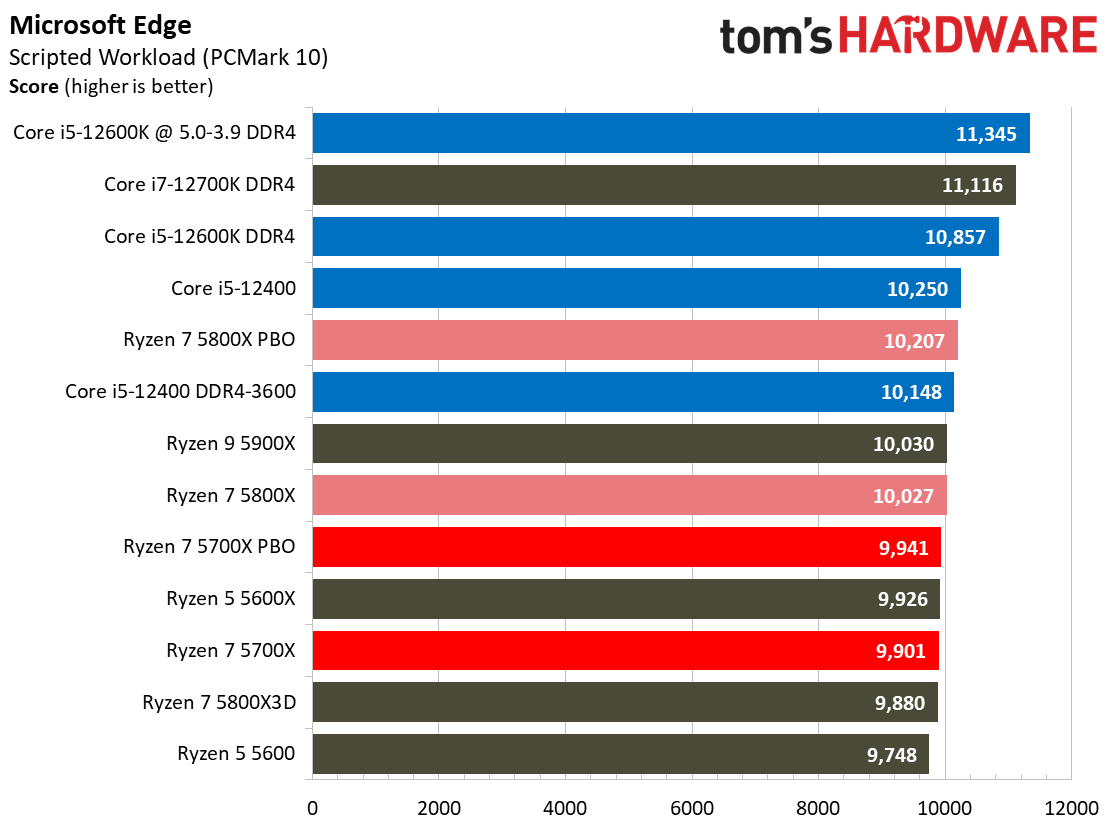
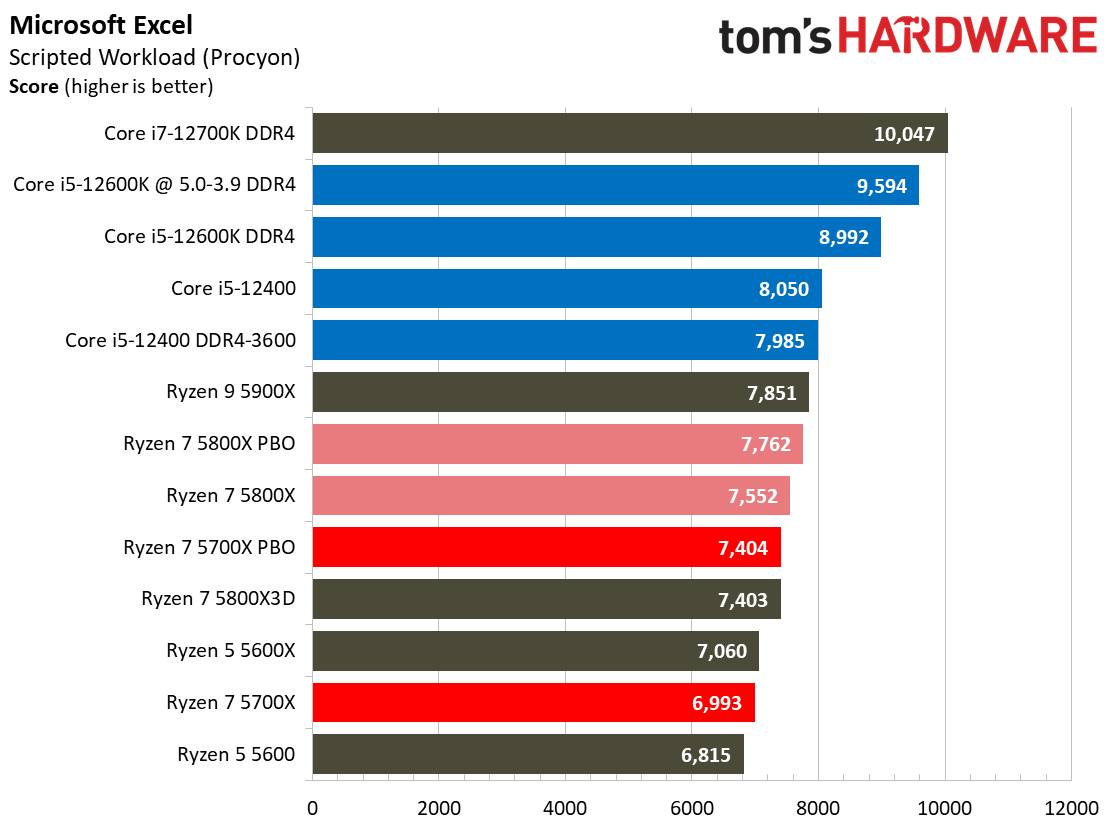
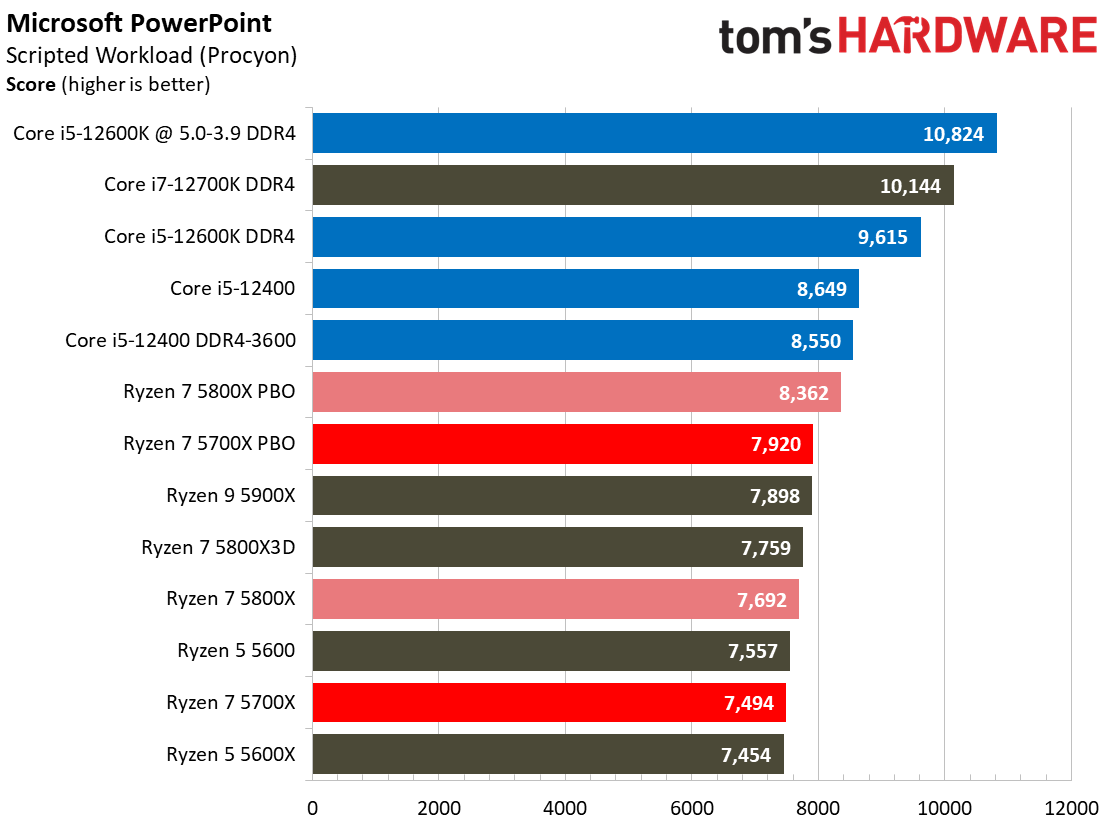
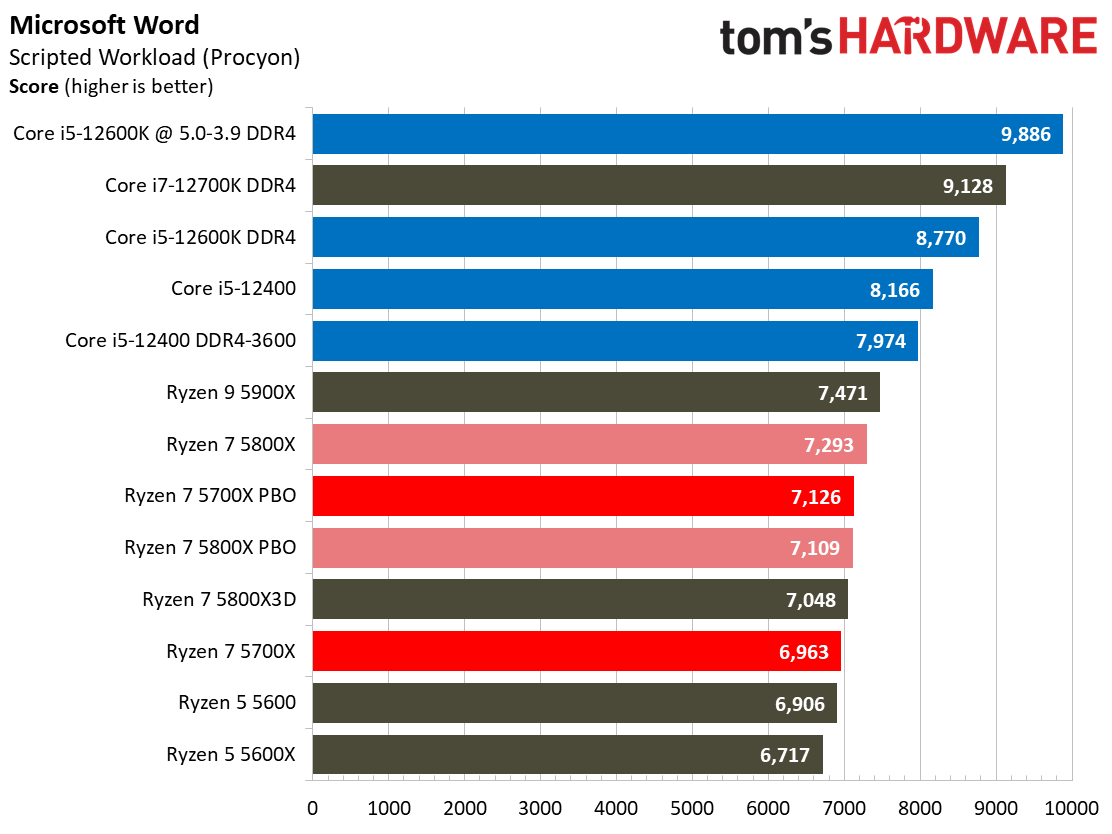
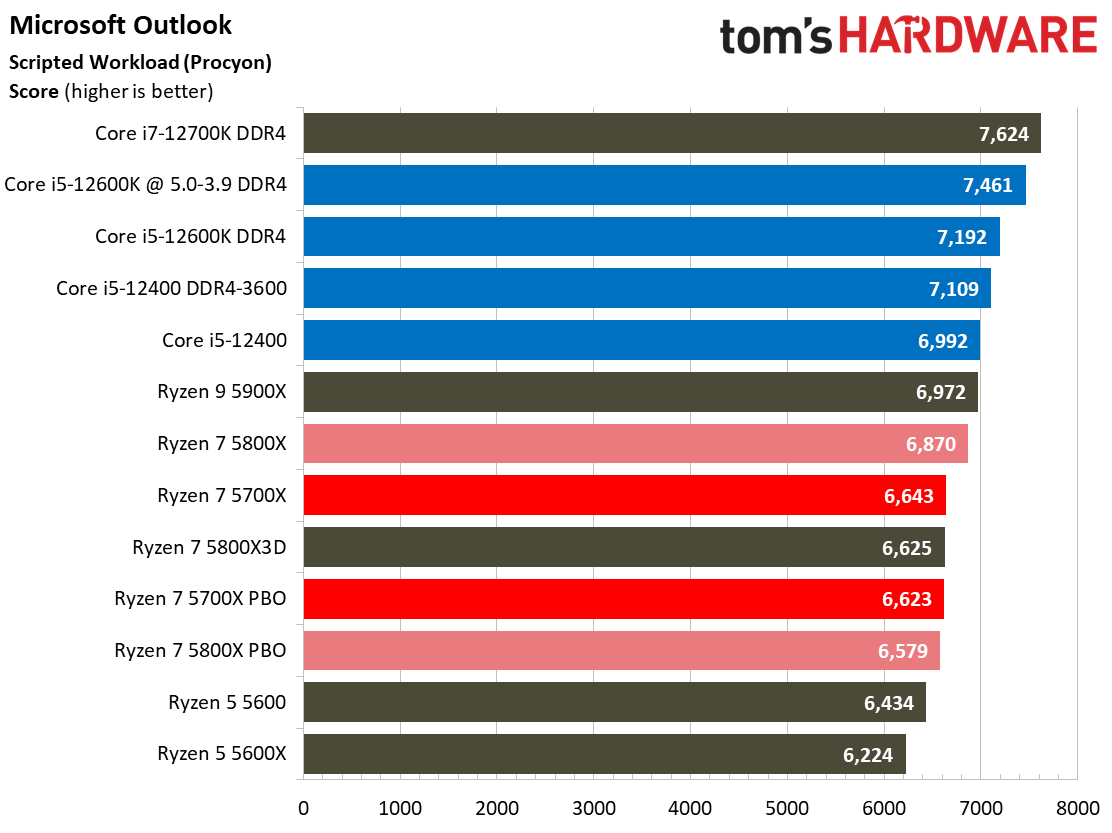
The ubiquitous web browser is one of the most frequently used applications. These tests tend to be lightly threaded, so a snappy response time is critical.
Adobe Premiere Pro, Photoshop, and Lightroom on AMD Ryzen 7 5700X
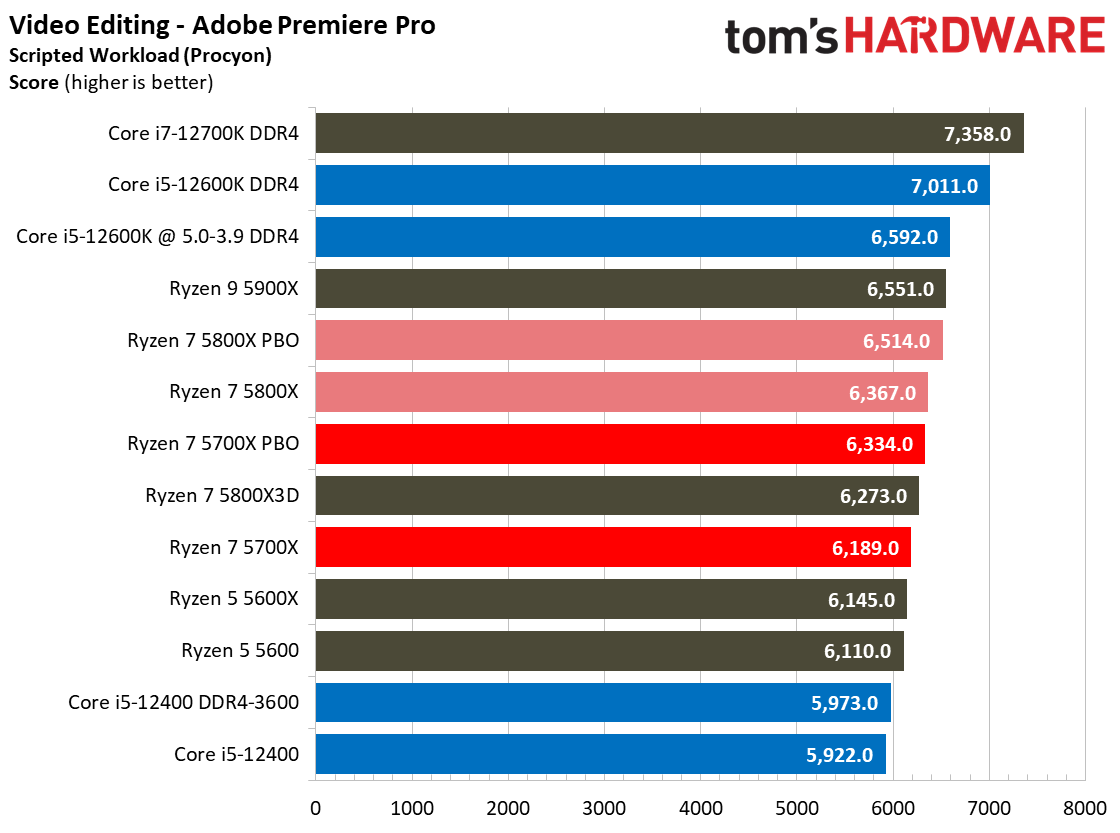
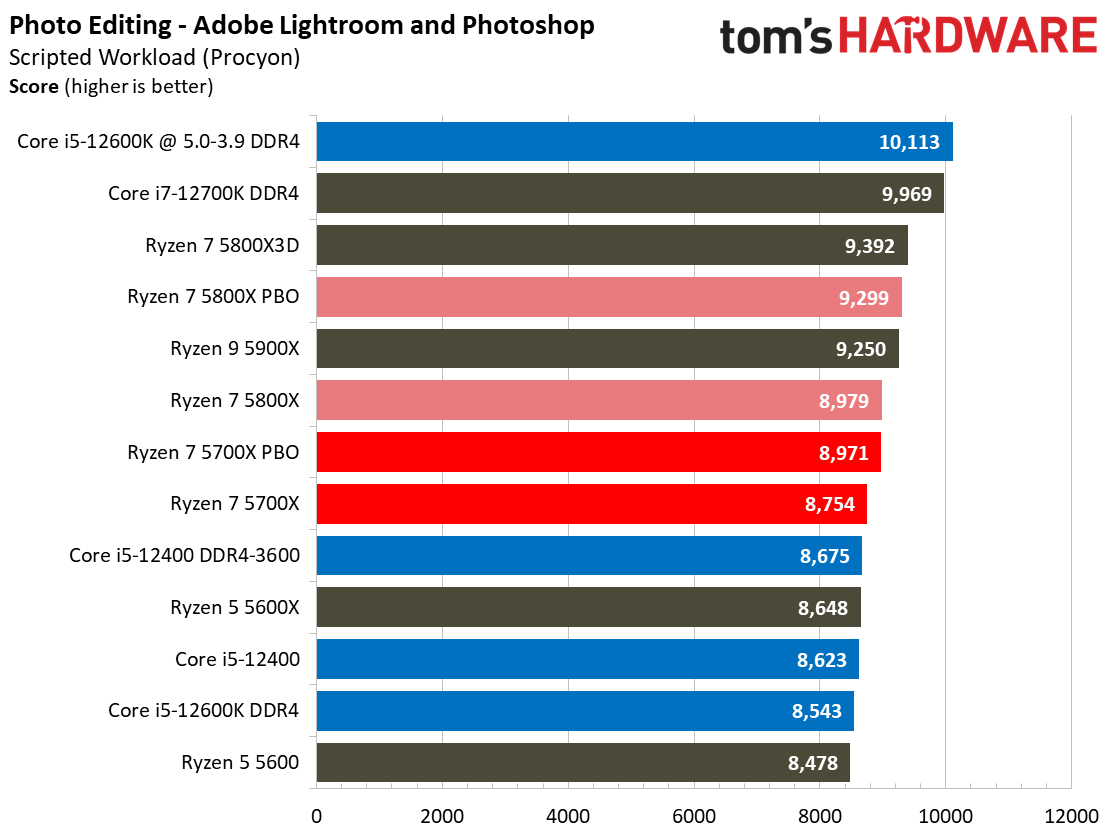
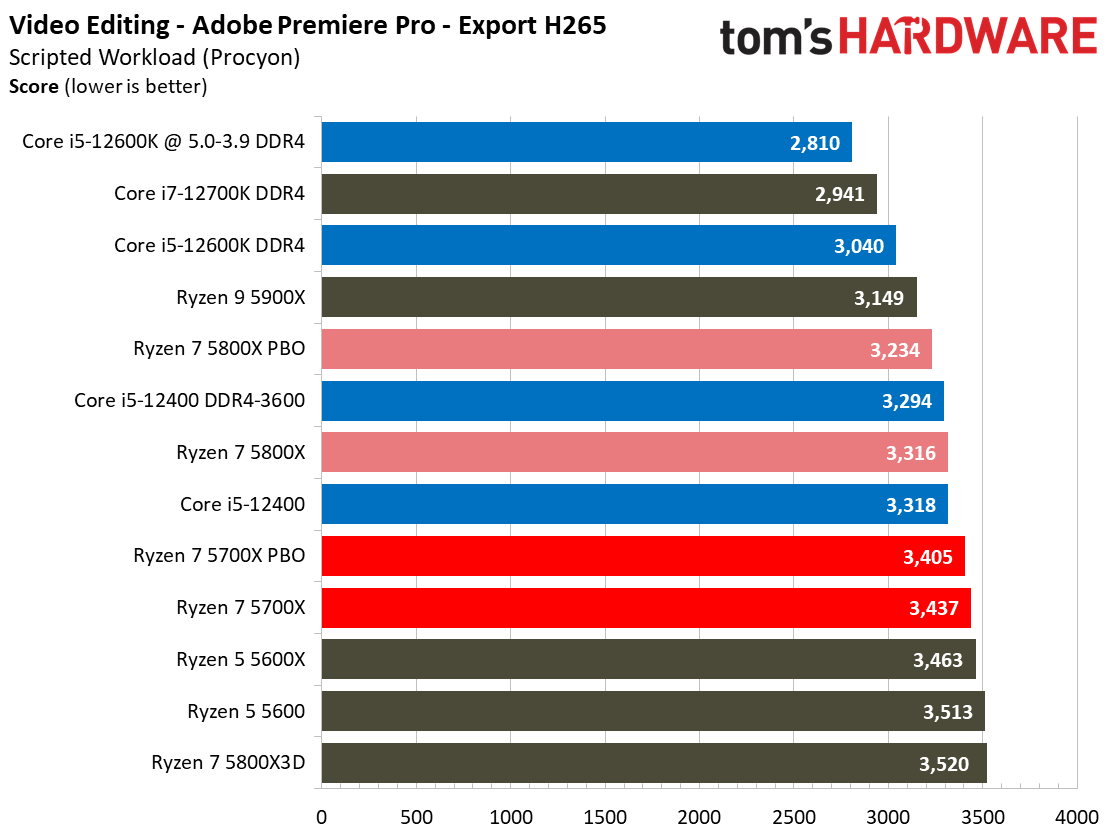
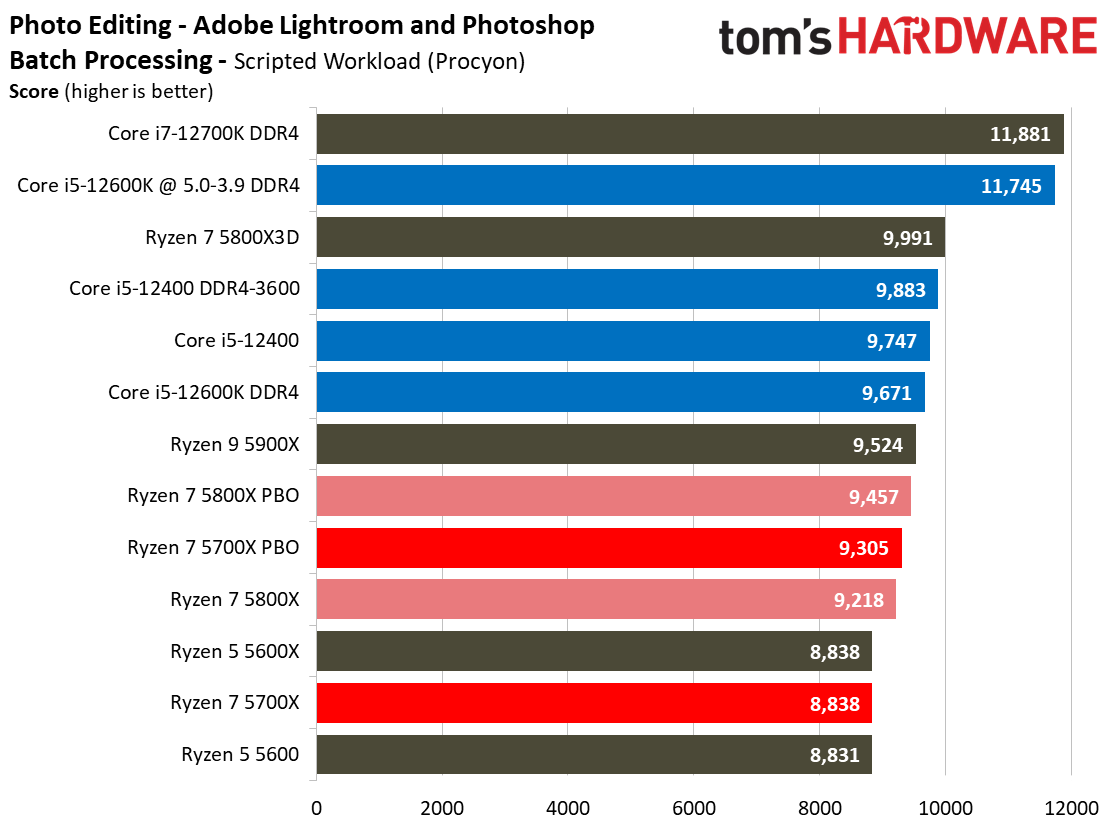
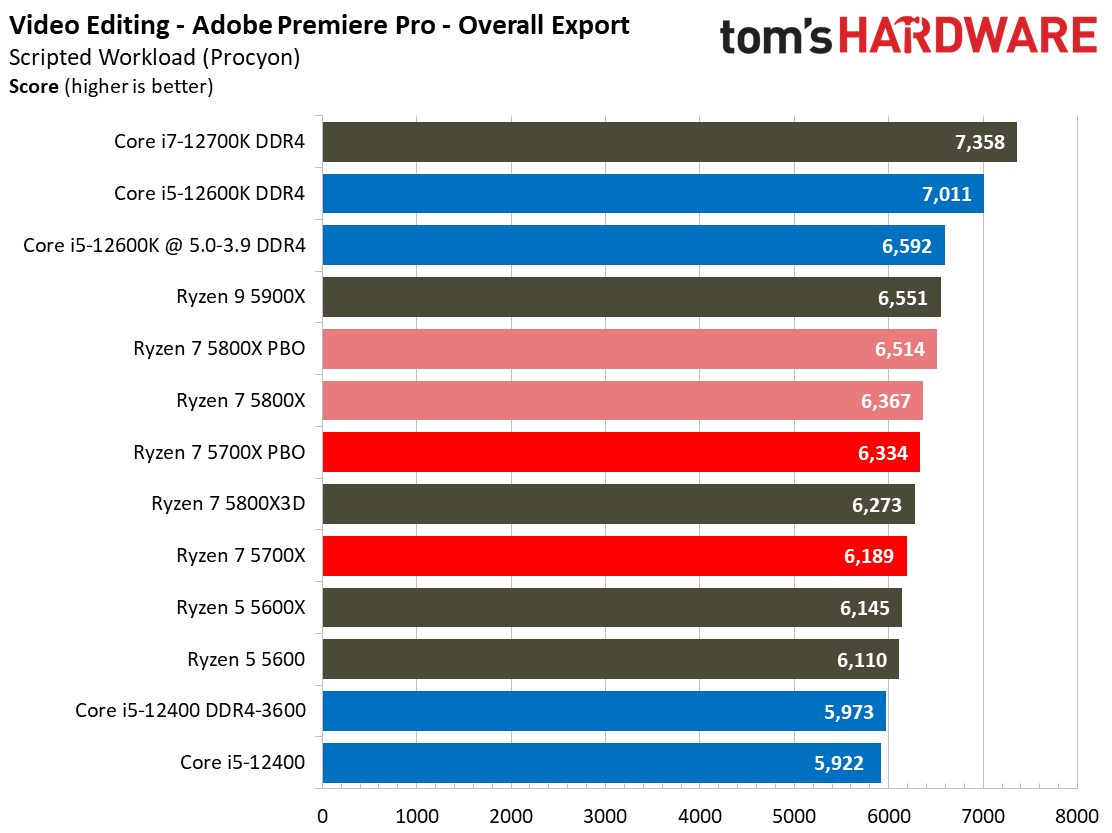
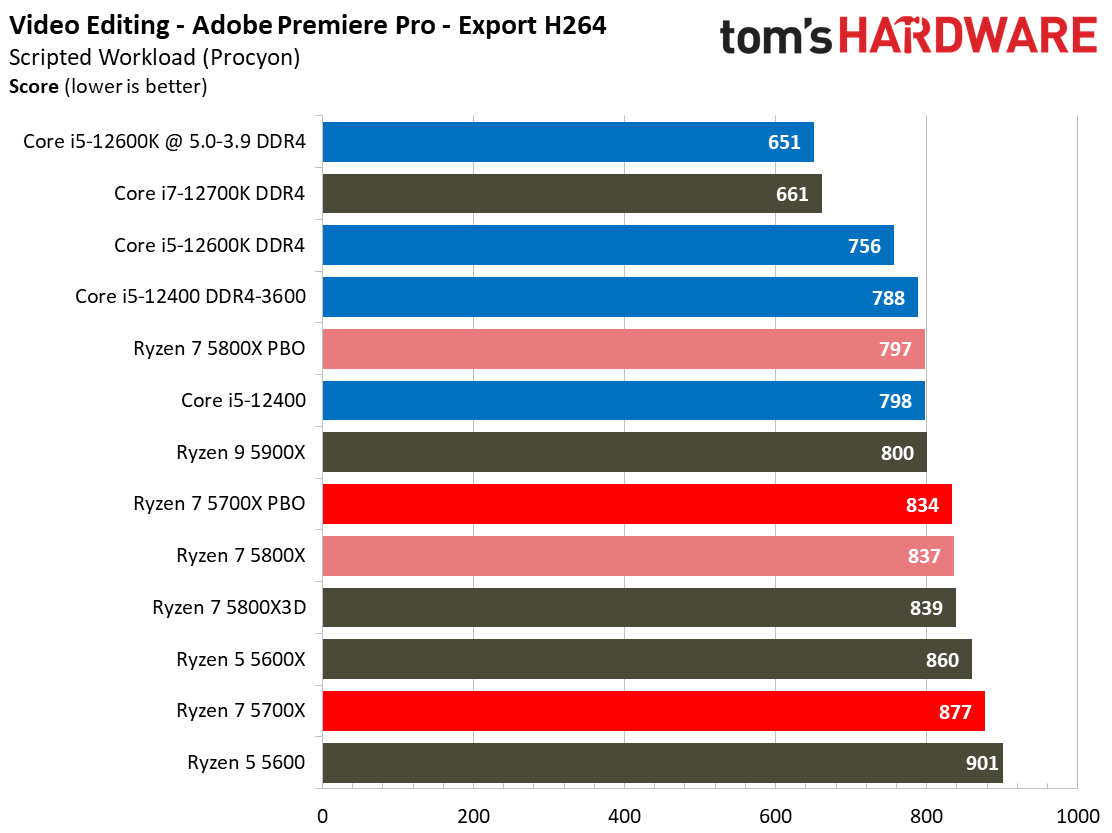
We've integrated the UL Benchmarks Procyon tests into our suite to replace the aging PCMark 10. This new benchmark runs complex Adobe Premiere Pro, Photoshop, and Lightroom workflows with the actual software, making for a great real-world test suite.
Compilation, Compression, AVX Benchmarks on AMD Ryzen 7 5700X
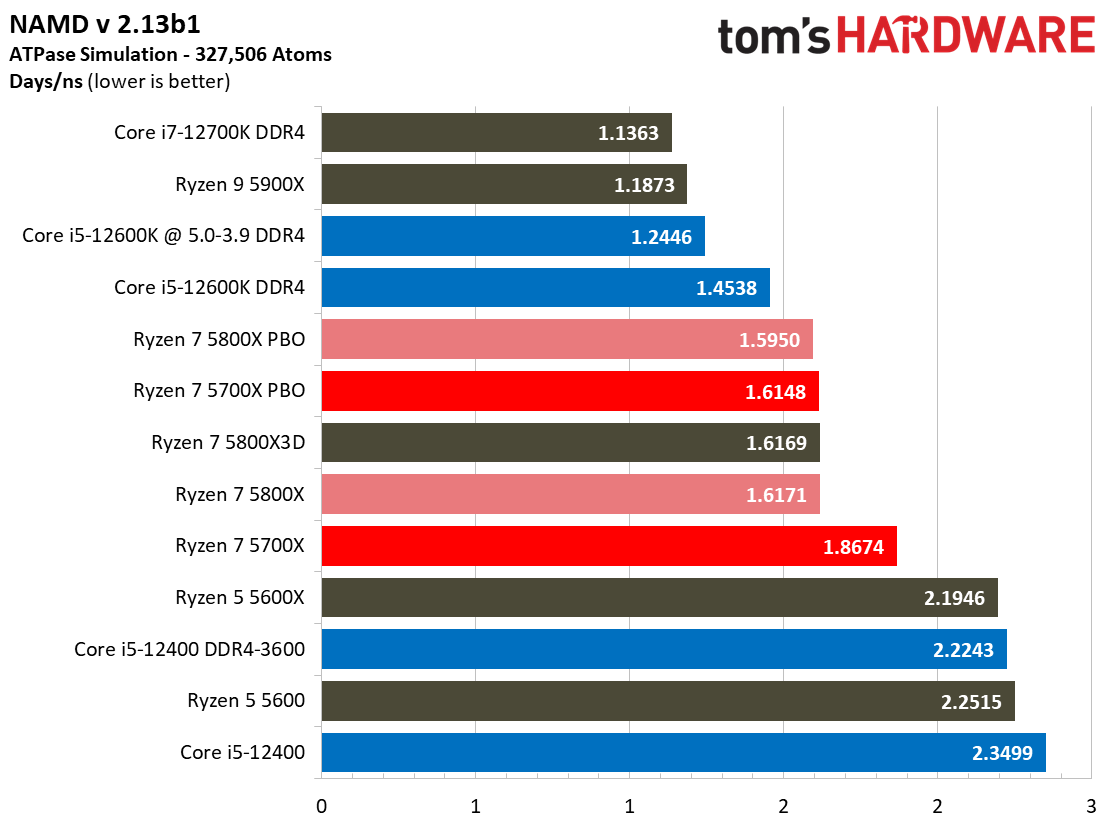
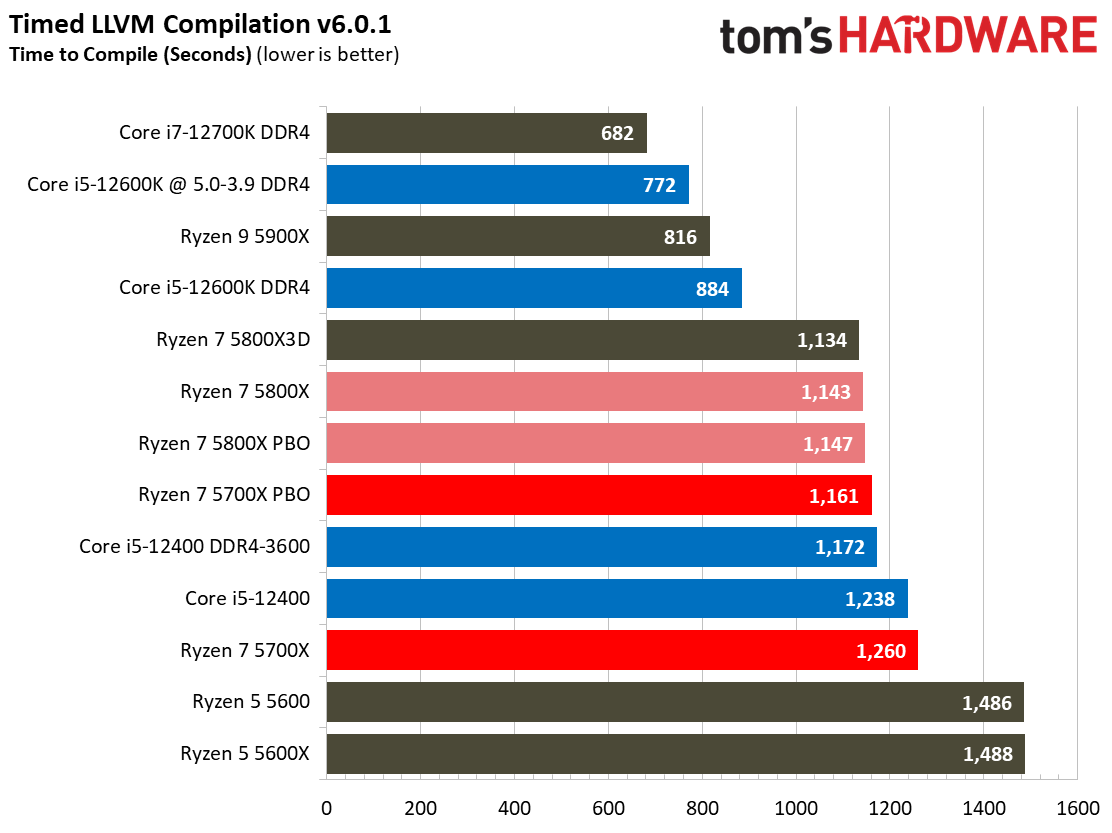
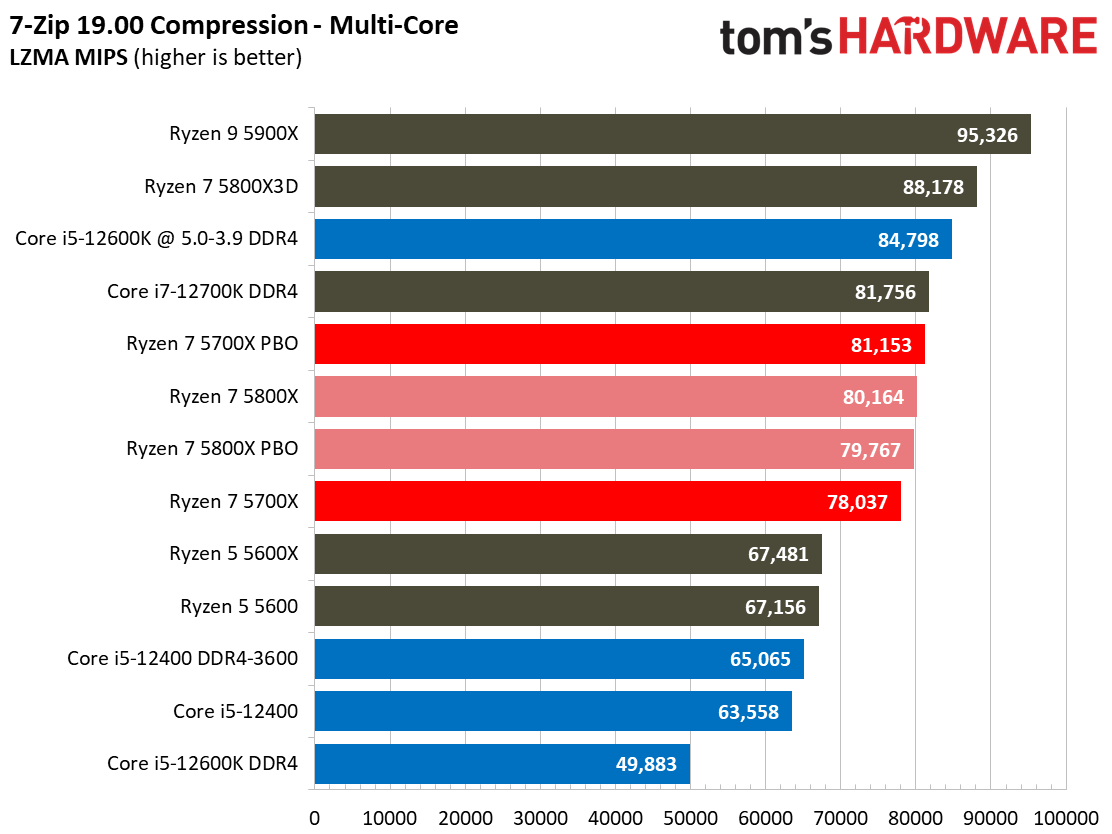
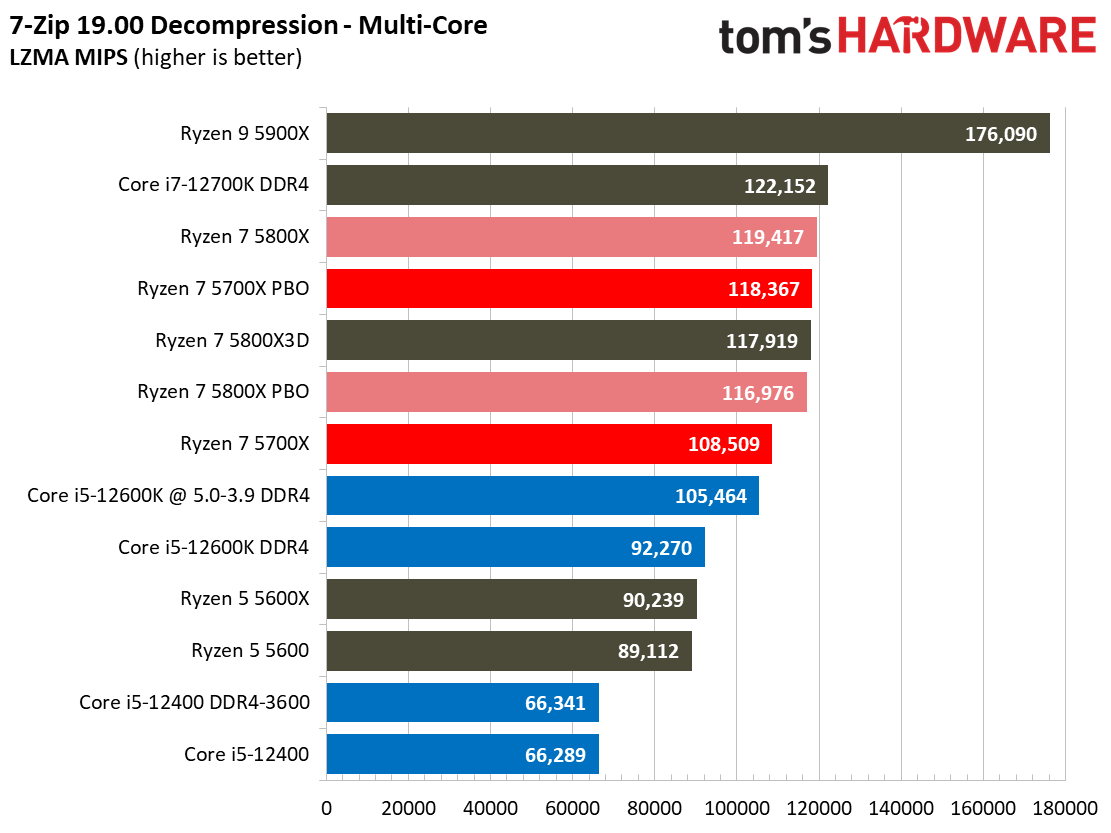
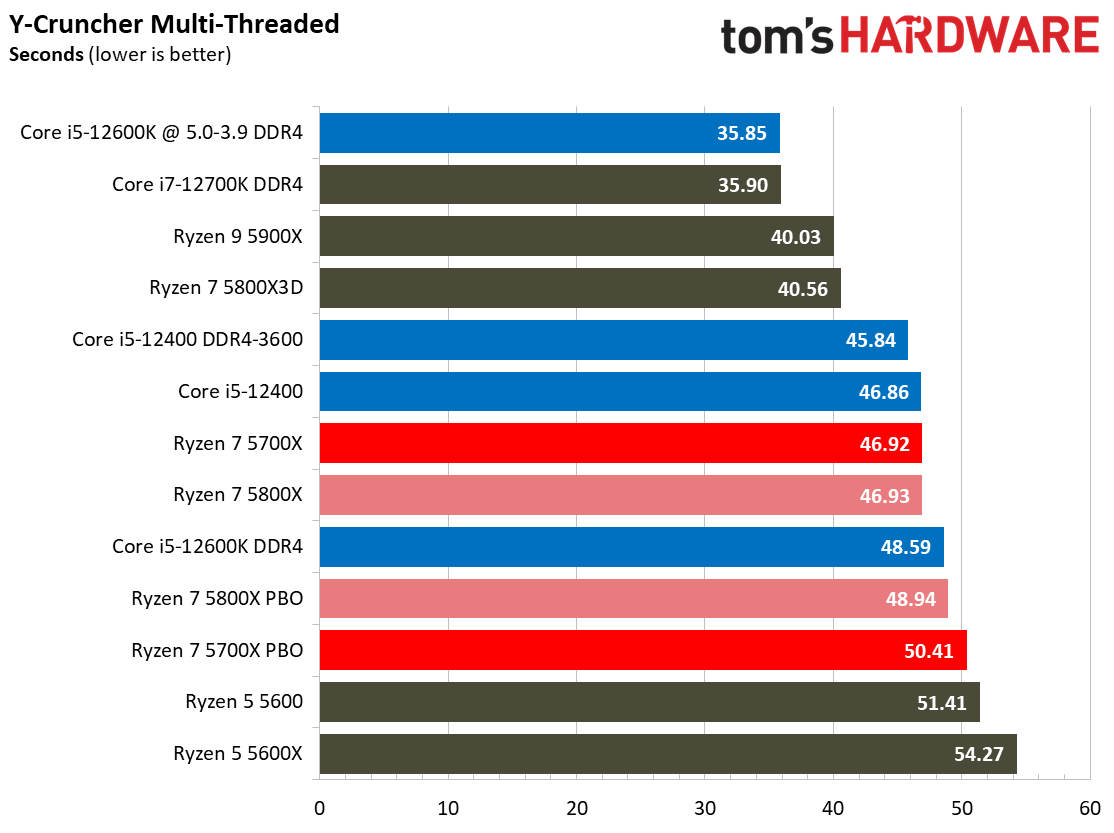
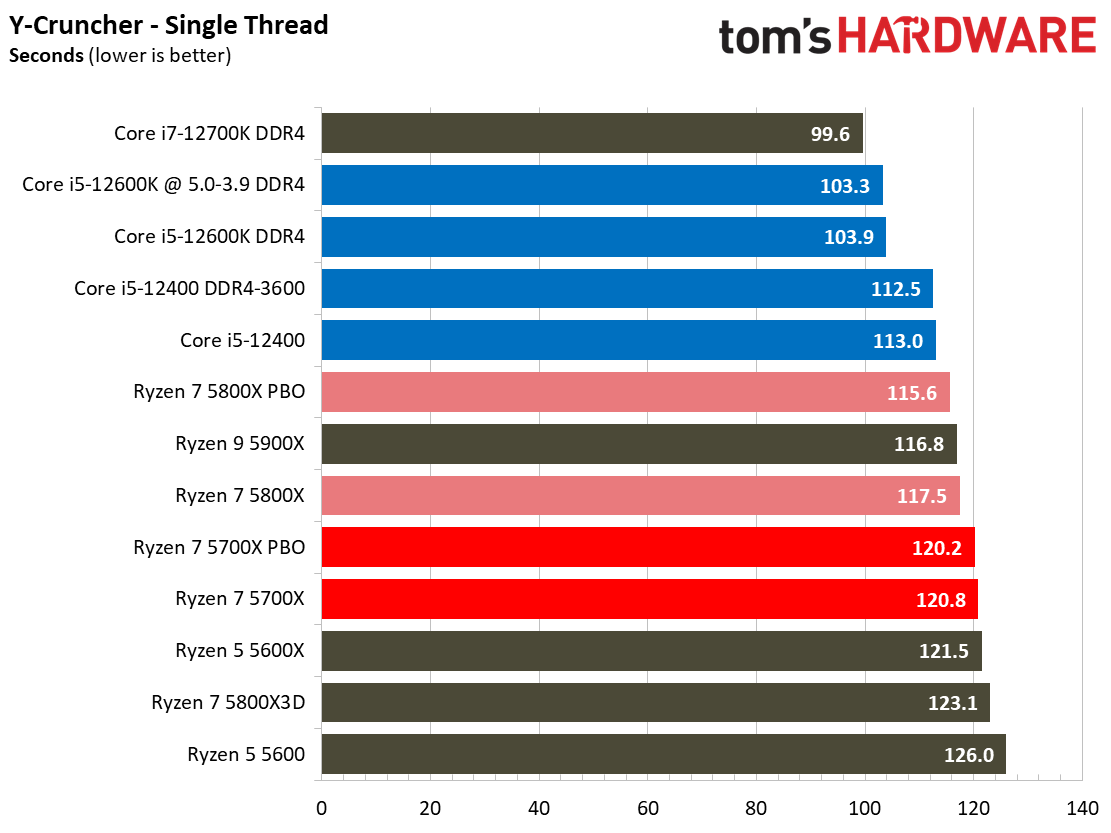
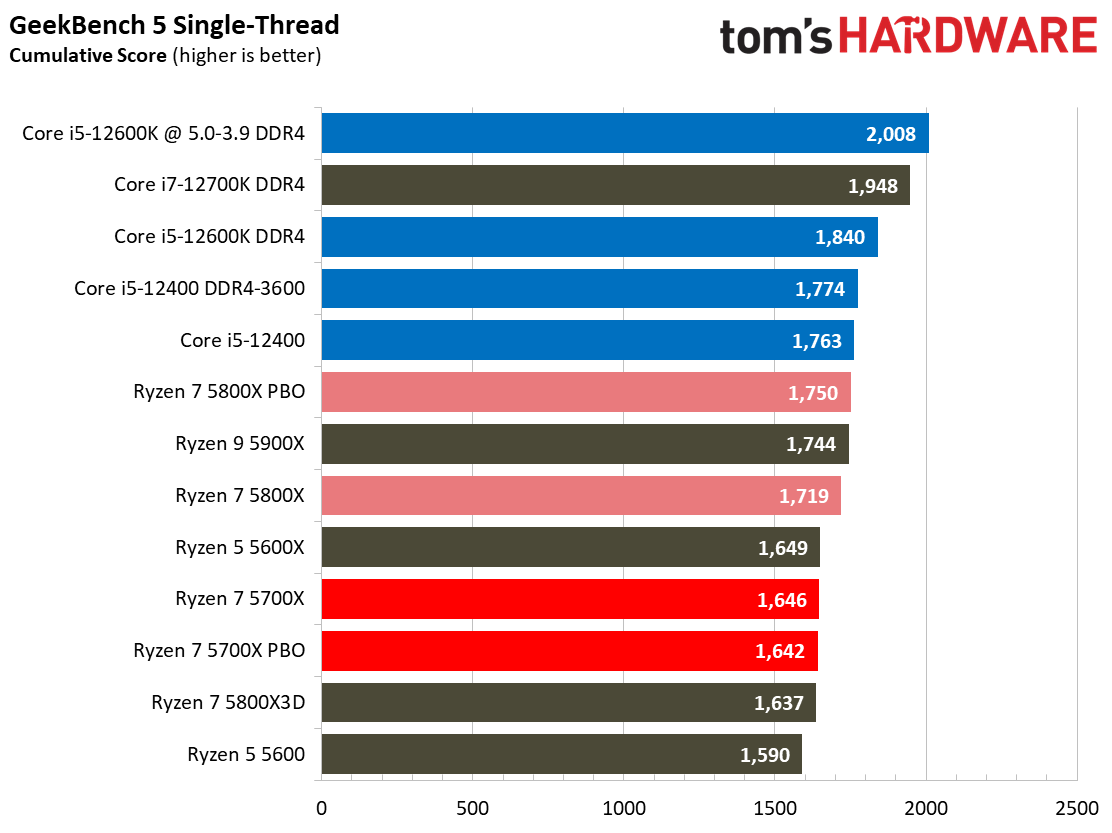
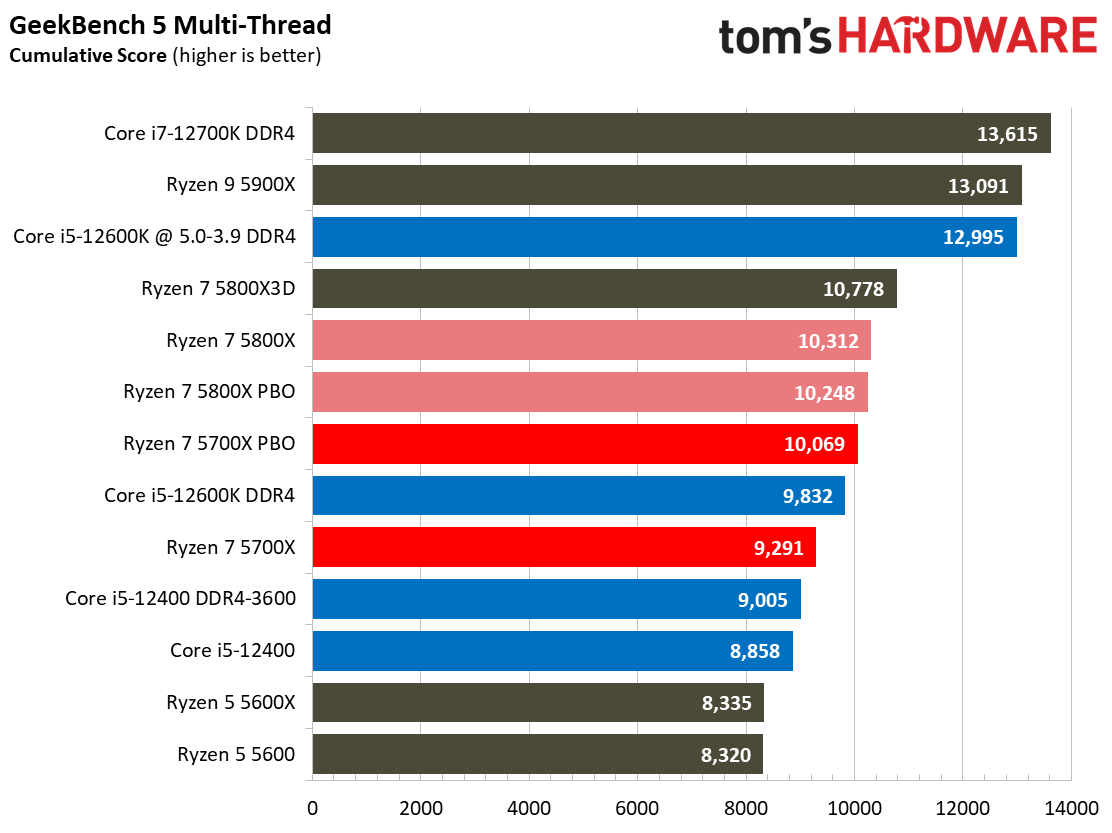
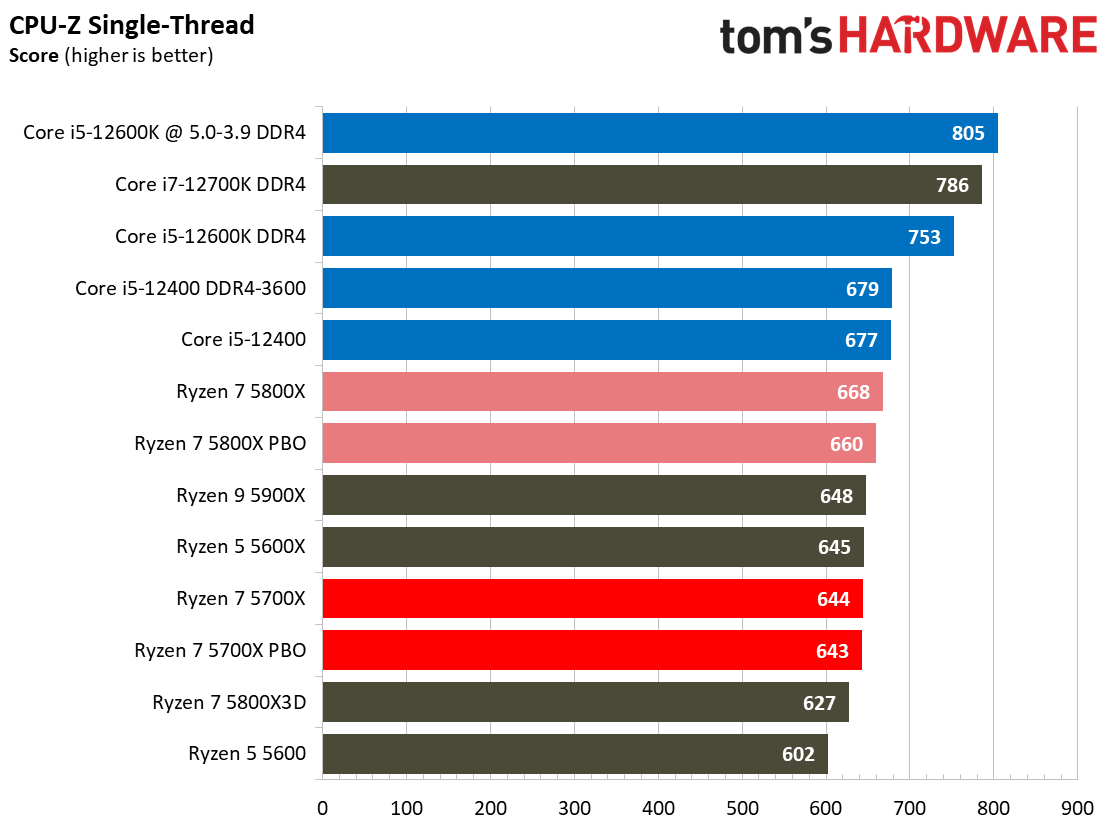
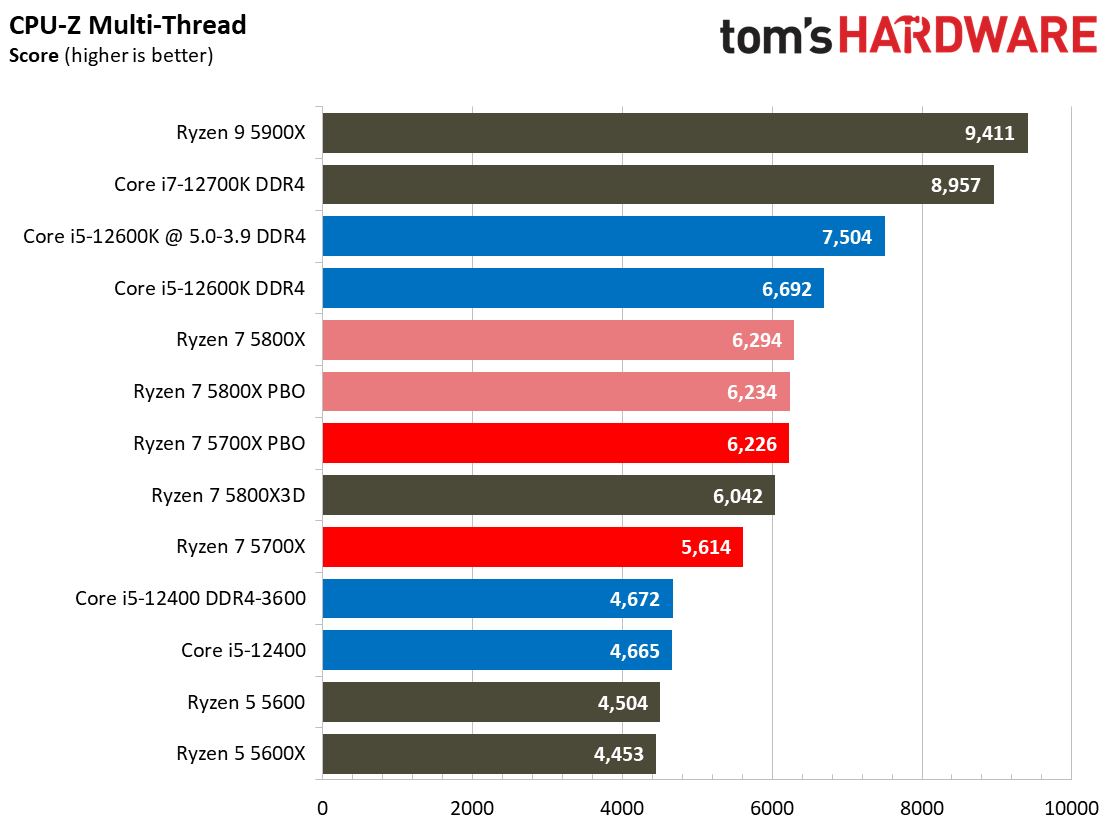
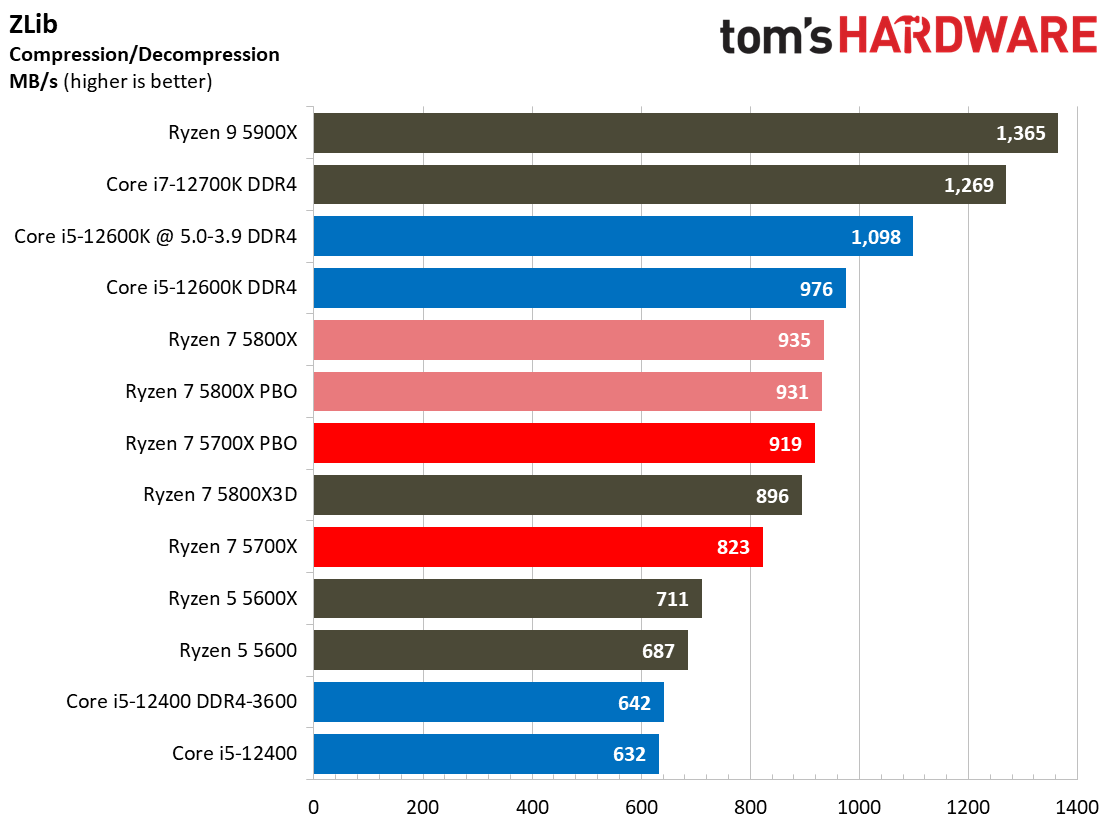
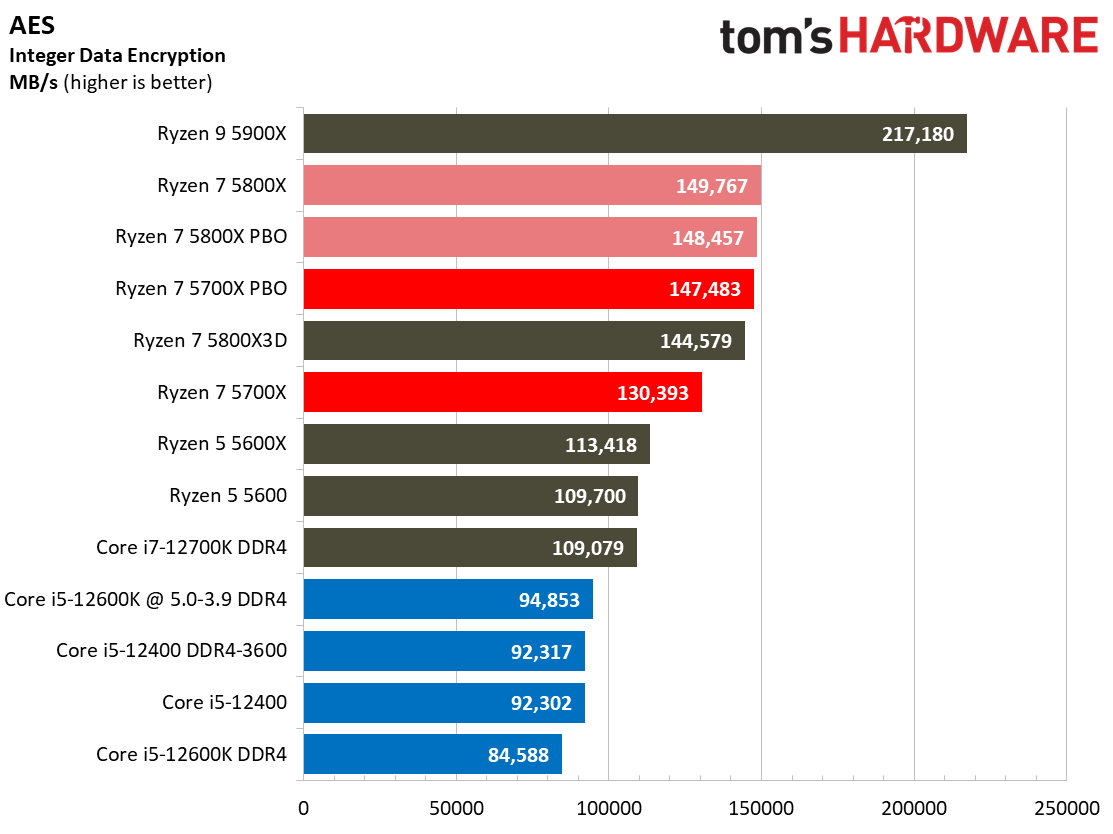
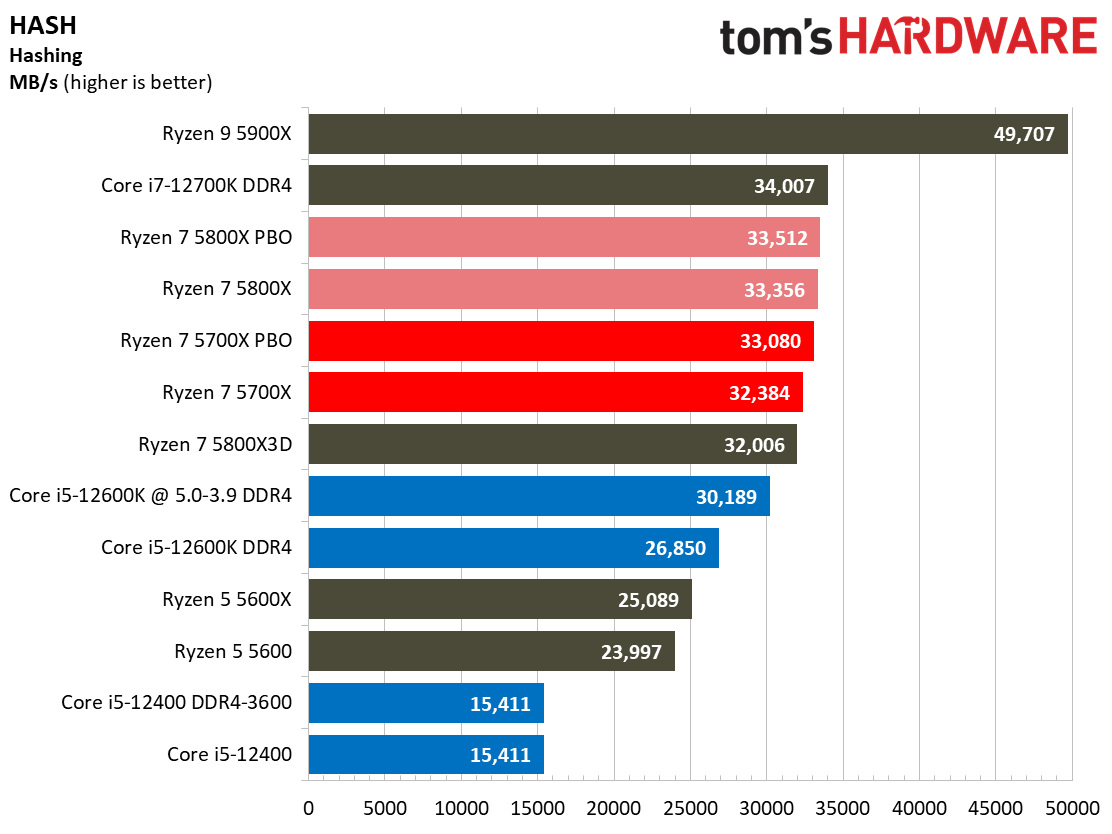
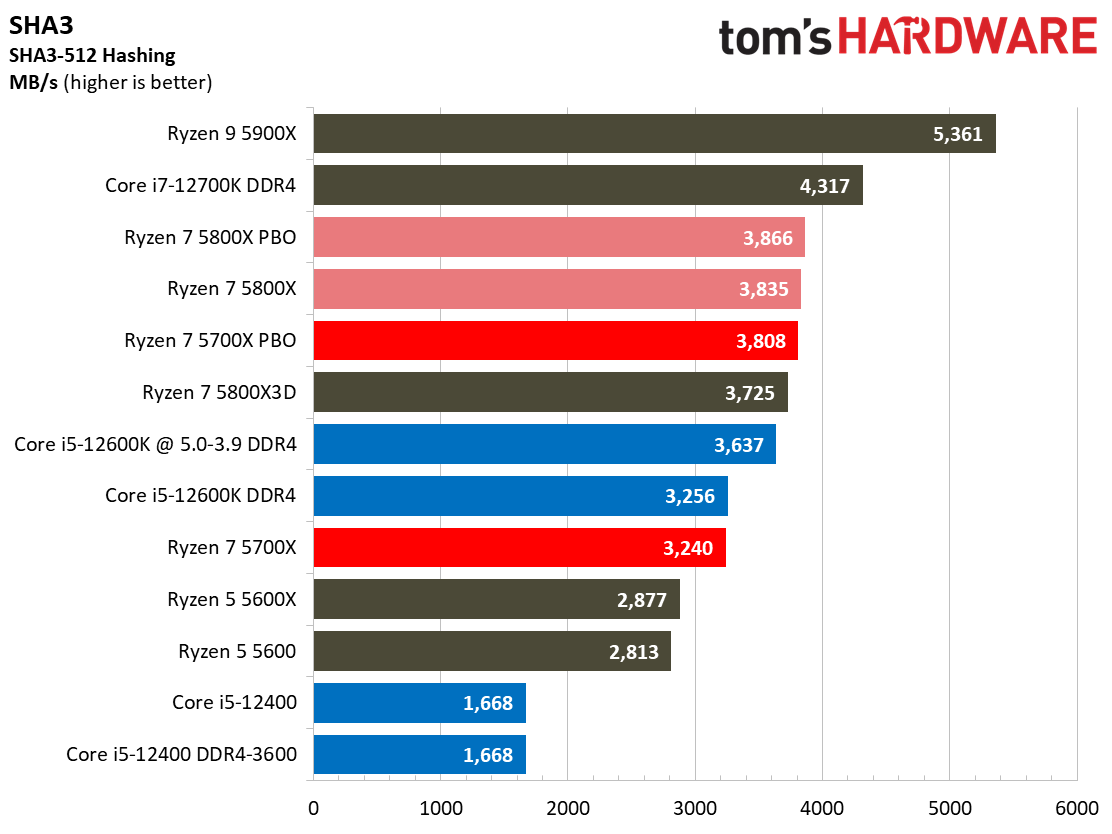
This grab bag of various tests finds the Ryzen 7 5700X exhibiting much the same performance trend as we've seen throughout this round of testing — after tuning, it is essentially the same as the Ryzen 7 5800X. That would be a bit more encouraging if, outside of decompression/compression and cryptography, the Core i5-12600K didn't outperform both Ryzen 7 models in the majority of these workloads.
- MORE: Best CPUs for Gaming
- MORE: CPU Benchmark Hierarchy
- MORE: AMD vs Intel
- MORE: How to check CPU temperature
Current page: AMD Ryzen 7 5700X Application Benchmarks
Prev Page AMD Ryzen 7 5700X Gaming Benchmarks Next Page A Price Cut in Disguise
Paul Alcorn is the Editor-in-Chief for Tom's Hardware US. He also writes news and reviews on CPUs, storage, and enterprise hardware.
-
Liquidrider Ignoring the misleading article for one second. What is the point of this article? It's a serious question? Because there was a price cut?Reply
"Intel beats AMD in EVERY facet" 🤣 Really? Does power consumption no longer matter to your readers? A 50% difference seems significant
Intel includes a cooler. Does it include a motherboard too? Because that is what is required when you buy ANY of Intel's 12000 series.
What is more shocking is creating an article that complains about a price cut coming too late. 5700 was released two months ago. And who complains about a price cut regardless of what it comes. Maybe the point of this article was that Intel is becoming desperate to sell more CPUs before their next earnings.
I am not trying to be mean, but it is a little bit frustrating for wasting a reader's time to push nonsense. You may even take this comment as an example -
mathextremist ReplyAdmin said:We put AMD's Ryzen 7 5700X through the wringer in our expanse set of benchmarks.
AMD Ryzen 7 5700X Review: A Price Cut Disguised as a New Chip : Read more
Are we sure this isn't just the public release of a re-named, OEM-only Ryzen 7 5800 (non-X) from the Alienware Aurora? I can't see any difference in the specs at all. -
agello24 Reply
i agree with you 100%. Toms ALLWAYS finds something negative to say about AMD, then turns around and praises a weak INTEL chip with a higher price.Liquidrider said:Ignoring the misleading article for one second. What is the point of this article? It's a serious question? Because there was a price cut?
"Intel beats AMD in EVERY facet" 🤣 Really? Does power consumption no longer matter to your readers? A 50% difference seems significant
Intel includes a cooler. Does it include a motherboard too? Because that is what is required when you buy ANY of Intel's 12000 series.
What is more shocking is creating an article that complains about a price cut coming too late. 5700 was released two months ago. And who complains about a price cut regardless of what it comes. Maybe the point of this article was that Intel is becoming desperate to sell more CPUs before their next earnings.
I am not trying to be mean, but it is a little bit frustrating for wasting a reader's time to push nonsense. You may even take this comment as an example -
hotaru251 Reply
amd's spec page has oem cpu with a 5c higher max temp than 5700x.mathextremist said:I can't see any difference in the specs at all.
and on topic: if u go intel you HAVE to buy new MB alogn with the cpu (and possibly ram)
if ur upgrading from any zen1-zen3 its still better to stay on am4.
if u were going to go to intel and pay new chipset anwyays wait few months and go am5.
AM5 is goign to thrash 12th gen from leaks (and 13th gen doesnt look too much better than 12th gen from them leaks) & AMD has said they will keep AM5 for a long time like AM4 (so betetr future upgrade paths too) -
TerryLaze Reply
Which intel CPU are you comparing to to get that result?Liquidrider said:"Intel beats AMD in EVERY facet" 🤣 Really? Does power consumption no longer matter to your readers? A 50% difference seems significant
First of all a 65W TDP AM4 cpu draws at least 88W.
https://www.gamersnexus.net/guides/3491-explaining-precision-boost-overdrive-benchmarks-auto-ocSecondly if you compare to the 12600k at stock settings that has 125w TDP the intel CPU is also more than 20% faster and is still cheaper.
The i5-12400 draws 117W max, is only insignificantly slower than the 5700x in multithread and is almost half the price. -
scottscholzpdx Benchmarks are useless without including 2700x, 2700 (65w), 2600, 1500, 1600af, and 1800x. Those are the people who are interested in a chip such as this and the article even alludes to this. It's a drop in replacement in an aging platform.Reply
Why they wouldn't include these in benchmarks is mind boggling. No one cares how this compares to a 5900x. -
Juergenonly This article has been published weeks back when the 5700X was released. Why does it show up now on the home page? I don't see any new content that would justify it.Reply
Outside of that, I agree that it is a more power efficient version of the 5800X which I can see is why AMD does offer it. Power efficiency is an advantage they have over Intel at this point and until they come with their own next gen platform, what else outside lower pricing could they have offered? -
daeros Thanks Toms, for reminding us where your budget comes from.Reply
Intel beats AMD at every metric. You know, other than total platform cost, power consumption, gaming performance (thanks to the 5800X3D), and all-out performance for HEDT/workstation users (hello Threadripper Pro 5995WX). -
Why_Me Reply
Power consumption is more of a thing with laptops ... not so much with desktops. With that said a i7 12700F can be had for $15 USD more.Liquidrider said:Ignoring the misleading article for one second. What is the point of this article? It's a serious question? Because there was a price cut?
"Intel beats AMD in EVERY facet" 🤣 Really? Does power consumption no longer matter to your readers? A 50% difference seems significant
Intel includes a cooler. Does it include a motherboard too? Because that is what is required when you buy ANY of Intel's 12000 series.
What is more shocking is creating an article that complains about a price cut coming too late. 5700 was released two months ago. And who complains about a price cut regardless of what it comes. Maybe the point of this article was that Intel is becoming desperate to sell more CPUs before their next earnings.
I am not trying to be mean, but it is a little bit frustrating for wasting a reader's time to push nonsense. You may even take this comment as an example
https://www.amazon.com/Intel-i7-12700F-2-1GHz-6xxChipset-BX8071512700F/dp/B09NPJDPVG/
Intel Core i7-12700F $312.97
-
Wisecracker Uhhhhh ...Reply
Has not the AMD Ryzen 7 "x700X " nomenclature always included a "Tame 65W TDP" ___ like the AMD 8/16 core/thread Ryzen 7 3700X ??
Maybe Paul needs to reconsider his Verdict ...
